- Help and Support

Heart conditions and travel insurance
Article contents.
Tegan Oldfield
3 August 2023 | Updated 20 October 2023 | 5 minute read
If you’re one of the seven million people in the UK living with a heart condition , it’s important to get the right travel insurance for you.
Here we discuss how to get insurance that covers you and your condition and how to stay safe while travelling.
Is it safe to travel with a heart condition?
You should speak to your doctor to find out if it is safe for you to travel.
For many, going abroad with a heart condition is still safe. Even if you have a pacemaker, cardiac resynchronisation therapy (CRT) device or implantable cardioverter defibrillator (ICD) fitted, you should be able to travel.
If you’ve recently had a heart attack or a major operation like heart surgery, you may need a letter from your doctor to prove you are fit to fly or travel.
Can I get travel insurance with a heart condition?
If you’re looking for travel insurance for heart conditions, each insurance provider will have their own rules around what they cover.
If you have pre-existing heart issues, you need to declare this to your insurer. Check whether the policy covers your specific condition and what it will protect you for, including any care you may need while away.
You can use MoneyHelper’s medical directory to find suitable insurance to cover your condition or by you can call 0800 138 7777 (open Monday to Friday 8:00-18:00 excl. bank holidays).
Find out more about travel insurance for medical conditions .
What heart conditions can travel insurance cover?
Insurers that provide cover for pre-existing conditions typically cover:
- atrial fibrillation
- high blood pressure and cholesterol
- heart attack/myocardial infarction
- cardiomyopathy
- blocked or narrowed arteries
- valve disease
- aortic aneurysm
- heart failure
- aortic stenosis
Check your policy book carefully to make sure your condition is covered; if you’re unsure, call your insurer.
What information do I need to tell my insurer?
You usually need to tell your insurer about any medical condition you’ve had within the last two years. But with a heart condition, you must tell them if you’ve ever had one.
You’ll need to let us know about:
- any problems with your heart
- recent surgeries or procedures you’ve had
- any emergency hospital visits
- the medications you take for your condition
You should always answer these questions truthfully. If you don’t let us know about a medical issue that you later need to claim for, your insurance will be invalidated .
This means you won’t be covered for the cost of any treatments you need or if you need to cancel a trip as a result of your heart condition.
Remember to inform your insurer about any health changes between buying your policy and going on holiday.
Is travel insurance with heart conditions more expensive?
You might have to pay more for your travel insurance if you have a heart condition.
It’ll depend on the severity of your condition and any other health problems you might have, but the price of your premium will always depend on:
- where you’re going
- how long you’re going for
- what activities you’ve planned
Travelling with a pre-existing heart condition
When travelling with a heart condition, you should bring:
1. A valid Global Health Insurance Card (GHIC) , so you can access lower-cost medical care if you’re travelling to Europe. Read our guide on using the GHIC in Europe .
2. Enough medication to last your trip and a few more days’ supply to be safe. Read our guide on travelling with medicine .
3. A Device Identification Card , if you have a heart device fitted (such as a pacemaker), which doctors can refer to if you do need treatment.
4. Recent medical letters, records of treatment you’ve had, and a copy of your electrocardiogram (ECG) , for the same reason as above.
Flying with a heart condition
You can also take a few measures while travelling to your destination to keep your heart healthy.
If you have a heart device, let the security staff at the airport know. Your device shouldn’t be affected if you walk through the security scanners at a reasonable pace, but the staff will need to be careful when using a handheld metal detector.
They should hold it at least 15cm away from your device and avoid repeatedly sweeping over or lingering over it for a while.
You also might be at higher risk of developing deep vein thrombosis (DVT) on flights, so move around regularly and wear compression socks to help prevent a blood clot.
Speak to your doctor before flying to get specialised advice.
What to avoid on holiday with a heart condition
Specific temperatures and activities on holiday could worsen your heart disease symptoms. You should avoid:
- Very hot or cold locations. Your heart will have to work harder, which can cause medical issues. Try to visit places with a mild climate and avoid using spa facilities like hot tubs, saunas or steam rooms.
- Travel to high altitudes. High altitudes can affect your heart, lungs and blood flow as the air is thinner, and it’s harder to take in the oxygen your body needs. Check with your doctor before travelling to anywhere 2,000 metres above sea level.
- Adventurous sports. Things like diving, skiing or other adventurous activities can strain your body and heart. You’ll need the go-ahead from your doctor to take part, but you should speak to your insurer too, as we might not cover you if you’re going to take part in high-risk activities.
Share with your friends...
Check out our related articles.

17 Mar 2023
Travel insurance explained

20 Oct 2023
Ultimate guide to travel vaccinations

24 Oct 2023
Travel insurance for people with diabetes
5 star defaqto rated platinum level travel insurance.
https://admiral.com/magazine/guides/travel/heart-conditions-and-travel-insurance
June 1, 2020
Due to travel restrictions, plans are only available with travel dates on or after
Due to travel restrictions, plans are only available with effective start dates on or after
Ukraine; Belarus; Moldova; North Korea; Russia; Israel
This is a test environment. Please proceed to AllianzTravelInsurance.com and remove all bookmarks or references to this site.

Use this tool to calculate all purchases like ski-lift passes, show tickets, or even rental equipment.

What's the Best Travel Insurance for Pre-Existing Medical Conditions?

You may think that a pre-existing condition means anything you’re being treated for at the time you purchase your travel insurance. The definition is actually broader than that. Allianz Global Assistance defines a pre-existing medical condition as:
An injury, illness, or medical condition that, within the 120 days prior to and including the purchase date of your policy:
- Caused a person to seek medical examination, diagnosis, care, or treatment by a doctor;
- Presented symptoms; or
- Required a person to take medication prescribed by a doctor (unless the condition or symptoms are controlled by that prescription, and the prescription has not changed).
It’s important to know that the illness, injury, or medical condition does not need to be formally diagnosed in order to be considered a pre-existing medical condition.
Let’s consider a few scenarios:
- Sudden, debilitating pain in an arthritic knee forces you to cancel your planned trekking tour of Iceland. Because you consulted your doctor about knee twinges three months ago, it’s considered a pre-existing condition.
- While sightseeing in Shanghai, you suffer a mild heart attack. Because you were diagnosed with coronary heart disease three weeks before purchasing travel insurance, this is considered a pre-existing condition.
- You were diagnosed with lupus many years ago, but it’s been in remission. You feel pretty good when you book your cruise to Bermuda, except for some fatigue and a rash. Then the Caribbean sun triggers a serious lupus flare, sending you to the hospital. Because you had symptoms when you booked your trip, this is considered a pre-existing condition.
2. Travel insurance requirements for covering pre-existing medical conditions
If you’re dealing with a pre-existing medical condition, that does not mean you can’t get travel insurance, or that you shouldn’t travel at all. You just have to read the insurance policy documents very carefully to make sure you meet all the requirements. As Conde Nast Traveler puts it , “it’s best not to make assumptions. Returning home in pain is bad enough. Don’t intensify it by unnecessarily paying thousands of dollars you could use on your next trip.”
Certain Allianz Global Assistance plans can include pre-existing medical condition coverage as long as you:
- Your policy was purchased within the time frame specified in your plan (usually 14 days of the date of the first trip payment or deposit.) In other words, don’t dawdle! Buy travel insurance as soon as you book your trip, so you don’t forget.
- Are a U.S. resident.
- Make sure you’re medically able to travel on the day you purchase the plan. Don’t assume you’re cleared to travel just because you feel OK that day. If you’re living with a chronic condition, or if you’ve recently had surgery or cancer treatment, it’s wise to get written approval to travel from your doctor.
- On the policy purchase date, insure the full non-refundable cost of your trip with Allianz Global Assistance — including trip arrangements that will become non-refundable or subject to cancellation penalties between the policy purchase date and the departure date. Make sure you include your airfare, hotel reservations, tour bookings and any other nonrefundable costs when you’re insuring your trip. If you incur additional non-refundable trip expenses after you purchase your policy, you must insure them with us within 14 days of their purchase. If you do not, those expenses will still be subject to the pre-existing medical condition exclusion.
3. What’s excluded from travel insurance coverage for pre-existing conditions
While most pre-existing conditions are covered by Allianz Global Assistance travel insurance, there are a few exceptions. Mental and nervous health disorders and normal pregnancy aren’t covered, for instance. If you want to make sure your particular condition is covered, speak with an insurance specialist before you buy.
Also, check the cap on trip costs. For the OneTrip Prime Plan , for instance, the total cost of your trip must be no more than $50,000 per person.
Why Allianz Global Assistance offers the best travel insurance for pre-existing medical conditions
If you have any kind of chronic health problem, travel insurance can save your vacation — or even your life. The best travel insurance for pre-existing conditions is the OneTrip Prime Plan from Allianz Global Assistance, which includes abundant coverage for covered emergency medical expenses overseas (up to $50,000). You also get emergency medical transportation benefits up to $500,000 to travel to the nearest appropriate medical facility or to return home. This is huge, especially if you suffer from a serious condition that might require advanced treatment. The OneTrip Premier Plan doubles these amounts.
Travel insurance from Allianz Global Assistance also can include trip cancellation and interruption benefits to reimburse you for non-refundable trip payments, in case you have to cancel your travel because of your covered pre-existing medical condition or another covered reason. You also get personalized, one-on-one help in emergencies from our hotline staff. Every day they help travelers who are suffering medical emergencies, lost documents, travel delays and other crises, all around the globe. But, our hotline experts say, the toughest thing they deal with is having to tell a customer who’s seriously ill that their pre-existing medical condition's not covered. That’s why it’s so important to follow the rules and meet the requirements.
Have questions about how to choose the best travel insurance for your covered pre-existing medical condition? Call our travel insurance advisers anytime at 1-866-884-3556. Travel happy!
Related Articles
- Trip Cancellation Insurance: Covered Reasons Explained
- When Does Travel Insurance Cover Existing Medical Conditions?
- Travel Insurance 101: Covered Illnesses

Get a Quote
{{travelBanText}} {{travelBanDateFormatted}}.
{{annualTravelBanText}} {{travelBanDateFormatted}}.
If your trip involves multiple destinations, please enter the destination where you’ll be spending the most time. It is not required to list all destinations on your policy.
Age of Traveler
Ages: {{quote.travelers_ages}}
If you were referred by a travel agent, enter the ACCAM number provided by your agent.
Travel Dates
{{quote.travel_dates ? quote.travel_dates : "Departure - Return" | formatDates}}
Plan Start Date
{{quote.start_date ? quote.start_date : "Date"}}
Share this Page
- {{errorMsgSendSocialEmail}}
Your browser does not support iframes.
Popular Travel Insurance Plans
- Annual Travel Insurance
- Cruise Insurance
- Domestic Travel Insurance
- International Travel Insurance
- Rental Car Insurance
View all of our travel insurance products
Terms, conditions, and exclusions apply. Please see your plan for full details. Benefits/Coverage may vary by state, and sublimits may apply.

Insurance benefits underwritten by BCS Insurance Company (OH, Administrative Office: 2 Mid America Plaza, Suite 200, Oakbrook Terrace, IL 60181), rated “A” (Excellent) by A.M. Best Co., under BCS Form No. 52.201 series or 52.401 series, or Jefferson Insurance Company (NY, Administrative Office: 9950 Mayland Drive, Richmond, VA 23233), rated “A+” (Superior) by A.M. Best Co., under Jefferson Form No. 101-C series or 101-P series, depending on your state of residence and plan chosen. A+ (Superior) and A (Excellent) are the 2nd and 3rd highest, respectively, of A.M. Best's 13 Financial Strength Ratings. Plans only available to U.S. residents and may not be available in all jurisdictions. Allianz Global Assistance and Allianz Travel Insurance are marks of AGA Service Company dba Allianz Global Assistance or its affiliates. Allianz Travel Insurance products are distributed by Allianz Global Assistance, the licensed producer and administrator of these plans and an affiliate of Jefferson Insurance Company. The insured shall not receive any special benefit or advantage due to the affiliation between AGA Service Company and Jefferson Insurance Company. Plans include insurance benefits and assistance services. Any Non-Insurance Assistance services purchased are provided through AGA Service Company. Except as expressly provided under your plan, you are responsible for charges you incur from third parties. Contact AGA Service Company at 800-284-8300 or 9950 Mayland Drive, Richmond, VA 23233 or [email protected] .
Return To Log In
Your session has expired. We are redirecting you to our sign-in page.
- About Founder
- News & Press
- See Our Reviews
- HONcode Certification
- HIPAA Compliance & Security
- Editorial Guidelines
- Sponsor Program
- Privacy Policy
- Terms & Conditions
- Adam's Book
- Hats & Fun Stuff
- About Community
- Patient News Feed
- Success Stories
- Adam's Blog
LEARNING CENTER
- Heart Valve News Feed
- Atrial Fibrillation
- Free Educational eBooks
- Medtronic Low-Risk TAVR
SURGEON FINDER
- Featured Surgeon
- Recommend Surgeon
HEART HOSPITALS
Adam's blog.
- About Adam Pick
Traveling Timeline After Heart Surgery
By Adam Pick on November 25, 2013
Travel during the holiday season is expected to increase this year, up from the 93.3 million travelers who ventured at least 50 miles away from home this time last year, according to AAA. Although many medical professionals recommend avoiding traveling during recovery, it seems practically unavoidable during this family-centered season. However, just because you might be going against this advice, it doesn’t mean you should throw all caution to the wind. These tips break down some important considerations for traveling after heart surgery.

The National Health Service recommends checking with your airline BEFORE flying, since companies have varying regulations on post-surgery travelers. However, the Civilian Aviation Authority says that 10 to 14 days is sufficient after chest surgery or a coronary artery bypass graft. After any heart operation, patients should remain moderately active to keep the heart pumping. Avoid tight clothing to prevent circulation inhibition as well.
During your early recovery, you’ll want to maintain only moderate activity at your destination. If your destination is the Midwest, consider staying at Wisconsin Dells resorts to take advantage of spas and other relaxation-enhancing amenities. In warmer weather conditions, swimming can also be a fun, light activity to stay active and cool.
Three months
At this point, you may be close to a full recovery but not quite there yet. (Hopefully, you will have taken my advice and attended a great cardiac rehab program.) Mostly, you’ll want to make sure to avoid overworking your heart. Get a full examination — BEFORE your trip — so your doctor can alert you of specific things to look out for. Taking medication like Dramamine isn’t recommended for flying, since you may sleep in a circulation-cutting position for an extended period of time. If you get nervous on airplanes or other forms of transportation, consider anti-anxiety medication instead, so you can keep your heart rate low without compromising your circulation.
Since being active can be difficult in an airplane, request to sit either in the very front or very back of the plane, so you can stretch your legs as often as possible. In the meantime, drink plenty of water, since the low humidity on planes increases the risk of dehydration.
Traveling itself may only come with minor considerations at this stage, such as staying hydrated and active. However, you’ll want to keep a close eye on your diet once you reach your destination. Especially during the holiday season, many people indulge in sugar-filled, high-fat foods. The American Heart Association recommends having less than 7 percent of saturated fat out of your total daily calories. Trans fats should comprise less than 1 percent of your daily intake, while cholesterol should never exceed 300 mg. The best way to reduce your saturated and trans fats intake is to reduce the amount of butter or margarine added to your food when cooking. Trim fat off of your meat or choose lean meats with under 10 percent fat to further cut back.
Right about this time… I traveled to Hawaii with Robyn, my wife, to celebrate my recovery. It was an amazing trip (see picture below).

At 10 months post-op, I went on a two-week business trip through five cities in Europe. During the trip, I had some chest pain — from the lifting and the moving of luggage in awkward positions — so I carried a bottle of Ibuprofen with me at all times to help ease the discomfort.
At the one year mark, many patients have reached full recovery status. Still, it’s always important to continue taking precautions when traveling. Make sure your travel insurance is up to date, since recent surgeries can often raise rates or lead to a higher copay. Access to medical care is highly important when you’re away from home, so feel free to check in with a doctor if anything feels abnormal.
I hope this timeline helps you plan your travel after heart surgery.
Keep on tickin! Adam
- Leave a Comment
- See 12 Comments
Written by Adam Pick - Patient & Website Founder

Adam Pick is a heart valve patient and author of The Patient's Guide To Heart Valve Surgery. In 2006, Adam founded HeartValveSurgery.com to educate and empower patients. This award-winning website has helped over 10 million people fight heart valve disease. Adam has been featured by the American Heart Association and Medical News Today.
12 Comments ... Click here to add one .
Name (required)
E-Mail Address (will not be published) (required)
Submit Comment
Adam's Newest Blogs
Adam's newest posts.

First Women’s Heart Health Congressional Day in Washington, DC!

Hartford HealthCare Joins Our Community!
New Community Posts

Richard says, "Seeing pictures of the recent tribute..."

Kevin says, "Day: -4 Last day of work. Spent..."
Blog Categories
Adam's blog categories.
- Adam's Updates
- Aortic Stenosis
- Aortic Valve Repair
- Aortic Valve Replacement
- Before Surgery
- Bicuspid Aortic Valve
- Heart Valve Replacement
- Medical Technology
- Mitral Regurgitation
- Mitral Valve Repair
- Patient Stories
- Ross Procedure
- Surgeons & Hospitals
- Tricuspid Valve
Heart Valve Hospitals
Search Heart Hospitals Search Hospitals
Surgeon Finder

Find and research over 1,500 patient-recommended heart valve surgeons.
New Posts From Our Community
Newest community post.

Richard Munson from Massachusetts says
Seeing pictures of the recent tribute and reunion of the living threes
Meet Richard
Richard says, "Seeing pictures of the recent tribute" Read more

Kevin McCarthy from Arlington, Massachusetts says
Day: -4 Last day of work. Spent some time dealing with the
Kevin says, "Day: -4 Last day of work. Spent" Read more

Annette Sterzel from Wayne, NJ says
I never use to sweat much in my life even during menopause but now as
Meet Annette
Annette says, "I never use to sweat much in my life" Read more

Find Heart Valve Surgeons
Search 1,500 patient-recommended surgeons
The Patient's Guide

This book has helped over 47,000 patients and caregivers from diagnosis to recovery.
Surgeon Spotlight

Dr. Marc Gerdisch is a heart valve expert having performed over 4,000 heart valve repair and replacement operations during his career.
See Patient Reviews

Mon - Fri 9am - 8pm
Sat 9am - 4pm
Sun 10am - 4pm
- 0800 294 2969
- Single Trip Travel Insurance
- Annual Travel Insurance
- Cruise Travel Insurance
- Family Travel Insurance
- Staycations
- Winter Sports
- Coronavirus
- Business Travel Insurance
- School Trip Travel Insurance
- All No Upper Age Limit Travel Insurance >
- Car Insurance
- Home Insurance
- Smart Luggage
- Life Insurance
Specialist Travel Insurance with no upper age limit
Angioplasty, atrial fibrillation, cardiomyopathy, high blood pressure.
- Multiple Sclerosis
- Breast Cancer
- Skin Cancer
- Lung Cancer
- Prostate Cancer
- Crohn’s Disease
- Back Problems
- Osteoporosis
- South Africa
- All Africa Insurance >
- All Asia Insurance >
- The Dominican Republic
- All Caribbean Insurance >
- All Central America Insurance >
- All Europe Insurance >
- Puerto Rico
- All North America Insurance >
- New Zealand
- All Oceania Insurance >
- All South America Insurance >
- Get a Quote
- Airport Hotels & Parking
- Travel Money
- Travel Advice
- Working with Us
- Medical Advice Hub
- Brand Showcase
- Meet The Team
- Careers: Apprenticeship Scheme
- Amend your policy
- Your Questions Answered
- Make A Complaint
- Making a Claim
Travel Insurance for Heart Conditions
Specialist travel insurance for heart conditions.
Providing your doctor has cleared you for travel, there is no reason why you shouldn’t! The best place to begin is with Specialised Travel Insurance for heart conditions. Using our quick and easy online quote process, you can answer a few questions about your heart condition diagnosis, including any if you have suffered a heart attack or heart failure, and then we’ll compare a range of insurers to get you the perfect deal for both cover and cost. We will only show you Travel Insurance policies specific to your heart condition, as well as your age, destination, and duration of your trip. A doctor’s certificate is not required when declaring your medical history and heart condition.
Medical Travel Insurance with Heart Condition Cover
Our panel of specialist medical insurers cover virtually all heart conditions, including Travel Insurance after a heart attack, angina, irregular heartbeat and ischaemic heart disease. If you have a pacemaker fitted or stent procedure, it should also be declared. We work with a panel of expert medical insurers, who provide premium Travel Insurance with heart condition cover. We are confident in our abilities to provide everyone with the means to travel safely, and if we can’t, we’ll signpost you to somewhere we think can cover your specific heart condition.
Our specialist Heart Conditions Travel Insurance offers emergency medical support, available online 24 hours a day, 365 days a year. Just Travel Cover provides policies that ensure support is always accessible.
Travel Insurance for Heart Conditions FAQs
Frequently asked questions about Travel Insurance for Heart Conditions .
What is Travel Insurance for heart conditions?
Travel Insurance for heart conditions is a specialised type of insurance designed to meet the needs of individuals travelling with cardiac-related health concerns, including Travel Insurance after heart attack, heart failure Travel Insurance and cover for specific heart conditions. This insurance covers medical treatment for pre-existing heart conditions while you are away from home, ensuring that you are not left facing financial strain along with your health concerns in the event of an unforeseen medical issue related to your heart condition.
When seeking Travel Insurance with heart conditions, it’s important to declare all aspects of your heart condition. Our panel of insurers specialises in providing cover for travellers with a history of heart-related issues, including those looking for Travel Insurance after a heart attack, or cover for conditions such as angina, arrhythmias, and ischaemic heart disease. By ensuring you have the right Travel Insurance for your heart condition, you can travel with confidence, knowing you’re adequately covered should something not go to plan relating to your heart condition.
What does Travel Insurance for heart conditions cover?
Travel Insurance is crucial for safeguarding against unforeseen medical emergencies abroad, especially for those with pre-existing heart conditions like angina or cardiovascular disease. It’s vital to declare these medical heart conditions to ensure substantial cover for treatments needed while travelling. Having the right cover for heart conditions could save you a lot of money when it comes to medical bills should you need treatment abroad for an existing or previous heart condition. Plus, your Travel Insurance for heart conditions will also offer cancellation cover, for example, if you need to cancel your trip for medical reasons relating to your previous/existing heart conditions.
Can I get Travel Insurance for all destinations if I’ve had a heart attack?
It is our aim to provide you with a Travel Insurance quotation wherever you’re going and whatever pre-existing medical condition you have – that’s why we work with specialist providers who cover hundreds of pre-existing medical conditions, including heart conditions and if you have suffered a heart attack. Let us know where you’re going and declare your medical conditions, and we will show you a list of prices and insurance options from insurers that can provide Travel Insurance after a heart attack.
Is Travel Insurance more expensive with angina or heart problems?
If you are wondering how much Travel Insurance is with a heart condition, Travel Insurance may be more expensive if you declare medical conditions as it provides cover for medical bills relating to these conditions rather than just treatment for any new injury/illness you sustain on holiday. The cost of treatment varies by country, and insurers will consider this, along with your age, and trip length, when calculating the premium. When you get a quote online, we compare prices and cover and show you a list of options to choose from, most of the time with a bronze, silver and gold option, depending on the level of cover you need. This way, you can compare heart condition Travel Insurance policies and choose the best option for your travel needs and budget.
Can I get Travel Insurance with a heart condition?
Yes, you can. We understand that some insurers may turn you away for your pre-existing heart conditions, but we are confident we can help you. We work with multiple insurers who specialise in cover for pre-existing medical conditions, including heart problems and heart conditions. Once you declare your heart condition and answer some questions, we will only show you the providers that can provide Travel Insurance with heart condition cover tailored to you.
If I have a heart condition and diabetes can I get Travel Insurance?
We can provide Travel Insurance with cover for hundreds of pre-existing medical conditions, including heart conditions, cholesterol, high blood pressure and diabetes. So, if you’re diabetic and you have had heart problems, then make sure you declare both medical conditions and answer our medical screening questions as accurately as possible. We will then show you a list of providers offering the cover you need so you can compare polices and choose the best level of cover for you.
Can you get travel insurance that covers my heart condition and my cancer diagnosis?
Finding Travel Insurance when you have/or have had cancer and you have had heart problems can be challenging and expensive. We work with specialist medical insurers to provide you with a choice of high-quality affordable cover for all pre-existing medical conditions. After entering your personal details, you can screen all conditions at the same time, answering a few questions to ensure you have the right medical cover in place. We’ll then show you a list of options to choose from, only showing you prices from providers who can cover both your heart conditions and cancer, should you need any treatment related to your pre-existing medical conditions when you’re on holiday.
Can I get Travel Insurance with cover for heart conditions at any age?
Yes, some of the insurers on our panel provide cover for all ages and can cover your pre-existing medical conditions too, for example, if you have had a heart attack, a bypass, or you’re living with angina. When getting a quote, it is extremely important to declare all of your pre-existing heart conditions, high blood pressure or high cholesterol. Even if your medical condition is controlled by medication, or you suffered a heart attack in the past, it must be declared.
Is there an upper age limit for Travel Insurance if I’ve got heart conditions?
We believe that age and medical history should not be a barrier to travel, and that’s why there’s no upper age limit on some of our policies. All quotes are tailored to you, so when you enter your details and answer the medical questionnaire, we will only show you prices from the insurers that can provide cover for you. Whether you’re over 55 or over 85, we could have a heart condition Travel Insurance policy for you.
Is Travel insurance more expensive after a heart attack?
Travel Insurance to cover heart conditions can be costly and vary depending on where you’re going due to the cost of medical treatment in that particular country. If you are wondering how much Travel Insurance is after a heart attack, it can vary depending on the severity of your heart condition, other pre-existing medical conditions, your age and the destination you are visiting and how long for.
While some insurers may turn you away, we work with insurers who specialise in covering pre-existing medical conditions, and we will compare prices and policies for you to find the cover you need. It’s important to remember that the price you pay for Travel Insurance is not just based on your medical history and conditions, but also age, destination and trip length, and will also depend on whether you want a single trip or an annual policy.
Will Just Travel Cover compare Travel Insurance for my heart conditions?
Yes, we will compare a range of specialist insurers to ensure we provide you with the best possible policy that covers your heart conditions. You will also usually have a bronze, silver and gold option to choose from where cover limits and excesses vary, along with the price.
Just Travel Cover works closely with our insurers to compare prices and policies. Get a quote and compare prices online. If you need further assistance or would rather speak to us directly, give us a call, and we will advise and direct you through the process.
Travel Insurance for All Kinds of Heart Conditions
- Heart attacks
- Ischaemic Heart Disease
- Atrial Fibrillation (irregular heart beat)
- Heart Murmurs and Heart Valve
How to Get a Quote
- Choose which type of travel insurance you require (single trip or annual)
- Give us some information about your trip (destination and dates)
- Declare your heart conditions along with any other medical conditions you have
- Add any travel insurance options you require, such as Winter Sports
- Choose from a range of travel insurance policies
We Compare Prices From These Insurers
Click here to download the Policy Wording and Insurance Product Information document for all insurers

What You Need to Know:
To ensure that your heart conditions are covered by your Travel Insurance you must declare your heart condition , as well as any other medical conditions you have. It is important that you answer the medical questions fully and accurately. We don’t need to see a doctor’s certificate. If you have had a heart bypass, a pacemaker fitted or a stent procedure, these will also need to be declared to us to ensure that you are properly covered by your Travel Insurance for heart conditions. Working with a panel of insurers, who are experts in providing travel insurance cover for heart conditions, means that we are able to find five-star Travel Insurance for someone with a heart condition . Don’t worry if you’ve been turned away by other insurers, we are confident that we will be able help you.
24 Hour Emergency Medical Support
All of our specialist Travel Insurance policies for heart conditions include access to a 24 hour emergency medical support service . A support team is available by phone 24 hours a day, 365 days a year, so if you do become ill on holiday and require medical treatment you can be sure that help and support will be available when you need it.
The Importance of Declaring All Medical Conditions
When you buy Travel Insurance it is extremely important to declare all of your pre-existing medical conditions , including any heart conditions, high blood pressure or high cholesterol. Even if your medical condition is controlled by medication, such as with high blood pressure, or your heart attack was a long time ago, it still needs to be declared when you buy travel insurance to ensure that you are properly covered.
Instant Cancellation Cover
Our online quote and medical screening engine enables you to compare and buy Travel Insurance quickly and easily.
Cancellation cover starts immediately from the moment of purchase for you and all the travel companions you insure under the policy, so you no longer need to worry about the unexpected and focus on getting ready for a trip of a lifetime.
Our Latest News

Travellers risk ‘financial ruin’ without Travel Insurance, say ABTA
May 1, 2024 | Blogs
ABTA says big increase in medical costs abroad makes Travel Insurance even more essential. The travel association has warned travellers that ...

Travel Insurance Checklist – Everything you need to know
Mar 20, 2024 | Blogs
We know that Travel Insurance can be complex especially for those who have pre-existing medical conditions, so we have pulled together our go-to...

Travel Insurance for Kidney Disease
Mar 13, 2024 | Blogs
Travel Insurance for Kidney Disease This March marks World Kidney Day and we're joining in to help raise awareness of kidney disease. We know that...
Compare prices in minutes

Copyright © 2023. Just Travel Cover
- Travel Tips Advice
- Compare Travel Insurance
- Pre-Existing Medical Conditions
- Holiday Home Insurance
Customer Services
- Opening Times
Victoria House, Toward Road, Sunderland, SR1 2QF
Call: 0800 294 2969
Monday - Thursday 9am - 6pm, Friday 9am - 5.30pm
Buy with Confidence
Secure Payments
UK Call Centre
Leading Broker
Justtravelcover.com is a trading style of Just Insurance Agents Limited, which is authorised and regulated by the Financial Conduct Authority (FCA) number 610022 for General Insurance Distribution activities. Registered in England. Company No 05399196, Victoria House, Toward Road, Sunderland SR1 2QF. Our services are covered by the Financial Ombudsman Service. If you cannot settle a complaint with us, eligible complainants may be entitled to refer it to the Financial Ombudsman Service for an independent assessment. The FOS Consumer Helpline is on 0800 023 4567 and their address is: Financial Ombudsman Service, Exchange Tower, London E14 9SR. Website: www.financial-ombudsman.org.uk/
Privacy Overview
- This insurance is suitable
- Travel Insurance
Travel Insurance for Heart Conditions
Conditions affecting the Heart can vary widely, in some cases only requiring monitoring or regular medication to have little impact on daily life; in other cases leading to the need to surgery, long-term careful management and some compromises both at home and when travelling. Buying the right Travel Insurance is an essential consideration for anyone with a Cardiovascular condition and a history of illness affecting the Heart can continue to have any impact on insurance cover for some time even after the condition has been corrected. Many travel insurance policies have exclusions or restrictions on existing medical conditions, so it is important to find a policy that takes into consideration both your medical history and current treatment so that you can travel with peace of mind. In the UK, over 7.5 million people are living with a Heart or Circulatory condition and whilst treatment and medication options are improving, Coronary Heart Disease remains a serious illness and the most common cause of Heart Attack. Travelling with inadequate insurance is never advisable, but for travellers with a current or historical Heart condition, comprehensive insurance is a must. We understand the importance of insurance cover for Cardiovascular and related conditions and our experienced Sales Consultants can guide you through the medical screening to help you choose the right cover for your needs . Worldwide Travel Insurance offers cover at competitive rates, with low medical endorsment premiums, giving you the cover you need at an affordable cost.
To find out more about insurance options for travellers affected by Diabetes, please call our office UK(+44) 01892 833338 or email us .
- Product Information
- Medical Conditions
- Sports & Activities

Benefits to travellers with Heart conditions when buying travel insurance with us:
- We offer a Specialist Screening service over the telephone for customers in the UK with medical conditions including Cardiovascular
- Medical screening is also available for some EU residents - please contact us for information
- For residents of other Countries, we are currently unable to screen existing medical conditions, so please contact us to discuss the policies we can offer
- In addition to our main range of comprehensive policies, we have insurance options with no age restrictions; cover for medical conditions whether long-term or recently diagnosed; cover for higher risk conditions. This enables us to assist you in finding the right cover for your individual needs
- We can cover UK and EU-based travellers with Heart Disease; Arrhythmia; Atherosclerosis; Angina; Atrial Fibrillation;Cardiomyopathy; Congenital Heart Disease; Ischaemic Heart Disease. We provide cover if you have had successful heart surgery; stenting; a Pacemaker fitted; Angioplasty; Cardioversion.
- Our policies can also insure many associated conditions including High Blood Pressure; High Cholesterol; Diabetes.
- our Sales Consultants are highly trained to provide a friendly, sympathetic and professional service.
Buy travel insurance from the experts...
- Worldwide Travel Insurance, a specialist in travel insurance and related products, has over 20yrs experience in offering high quality cover at great prices.
- All policies purchased online are emailed immediately - ideal for last-minute bookings.
- Cooling-off Period: You have 14 days following receipt of your documents during which you can obtain a full refund if you have not travelled and no claim has arisen.
Customers with Serious Medical Conditions
If you are resident in the UK, the Money & Pensions Service (MaPs) has developed a directory of specialist Travel Insurance providers to assist UK-based travellers with existing medical conditions to obtain travel insurance that is affordable. If, due to a serious medical condition, we are unable to offer cover and you are having difficulty finding suitable insurance, you can use the MaPs travel insurance Directory to find a Company that may be able to help. Go to www.moneyadviceservice.org.uk or call 0800 138 7777 (Mon to Fri 8am – 6pm).
A wide range of Insurance Policies to suit your individual needs
Our policies include:.
Your security with Worldwide Travel Insurance:
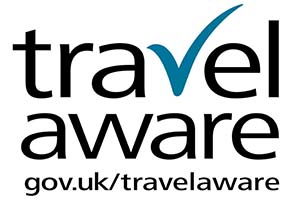
Essay icons created by Freepik - Flaticon
Can You Fly After Open Heart Surgery?

Open heart surgery can be minimally invasive or require a long period of recovery. In any case, you or your loved one will likely be in a more delicate state. This means your normal routine, including work, exercise, activities and travel, may not be feasible for several weeks or more. If you have a trip planned in the near future or had your surgery done in another state, traveling by plane can potentially create health complications.
Flying on a commercial airplane is not always recommended for recovering patients, especially those with conditions like diabetes. If you want to know whether it is safe to travel after heart surgery, consider the potential risks of traveling and alternative modes of long-distance patient transportation.
What Is Open Heart Surgery?

Open heart surgery is an umbrella term people use to describe surgical procedures that treat heart problems. This type of surgery typically involves the heart muscle, arteries, valves, aorta and coronary arteries. Open heart surgery gets its name from the nature of the procedure itself, which often requires surgeons to cut through an individual’s breastbone and spread their ribs to perform surgery on their heart. Typically, individuals with heart problems who do not see improvements with medications, lifestyle changes or other procedures may require open heart surgery.
With open heart surgery, surgeons can access the heart to treat the following conditions :
- Coronary artery disease
- Heart valve disease
- Heart failure
- Thoracic aortic aneurysm
- Congenital heart defects, such as hypoplastic left heart syndrome or arterial septal defect
- Arrhythmias
- Atrial fibrillation
- Coronary artery bypass graft (CABG)
In some cases, an individual’s heart will be stopped during open heart surgery. If so, they are connected to a bypass pump, or heart-lung bypass machine, during the procedure. This machine acts as the heart and lungs during the surgery, moving blood through the body and providing oxygen to the blood.
However, patients who require less invasive surgery with smaller incisions may have the procedure performed while their heart is still beating. This form of surgery requires smaller cuts between the ribs. Some patients may undergo open heart surgery to repair issues from a heart attack, for a heart transplant or for valve replacement. The type of surgery a heart patient has depends on their unique condition or combination of problems.
Complications and Restrictions After Open Heart Surgery
Having a major medical procedure like open heart surgery comes with the potential for complications. It’s important to know that you may be limited or restricted in what you can do as you recover.
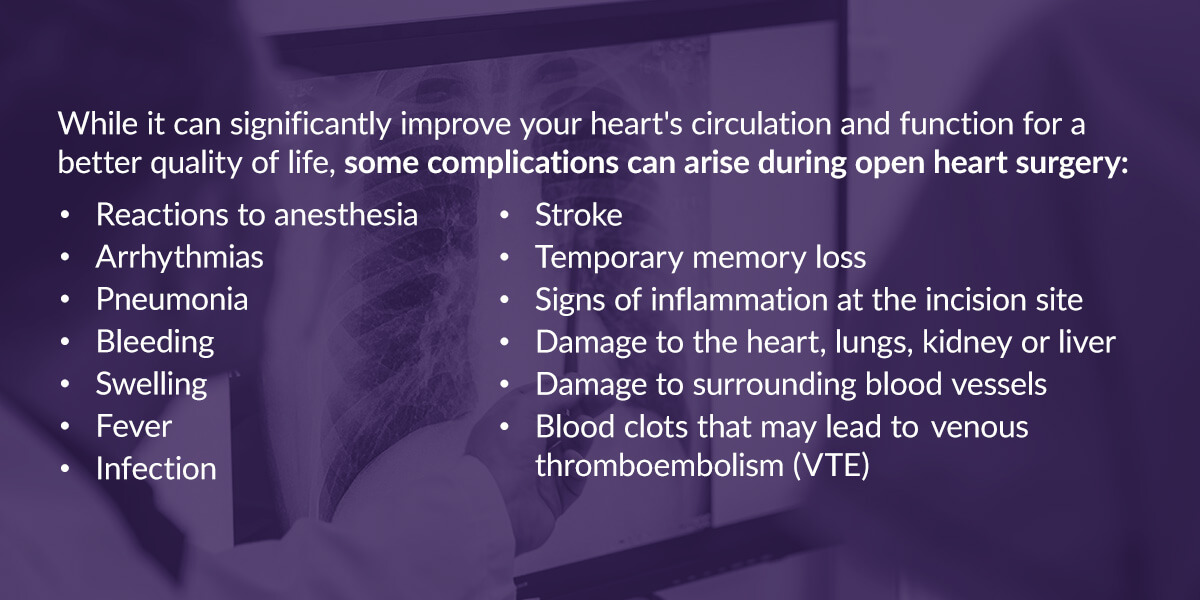
- Reactions to anesthesia
- Temporary memory loss
- Signs of inflammation at the incision site
- Damage to the heart, lungs, kidney or liver
- Damage to surrounding blood vessels
- Blood clots that may lead to venous thromboembolism (VTE)
The severity of these risks also depends on the type of heart condition you have and your overall health.
Second, your lifestyle may change during recovery. Depending on the type of surgery you had, you may need to take medication, attend physical therapy, and get plenty of rest as your chest muscles and breastbone heal. This means your typical activities may need to be postponed until you are well enough.
Third, your travel abilities may be limited for several weeks or more. The complications of heart surgery noted above may become a greater risk if you engage in activities that are too strenuous during recovery, such as intense exercise or flying. If you plan on traveling, some airlines may require you to receive a medical clearance certificate from your doctor. This certificate shows that your health care providers “clear” you to participate in certain activities, including flying across long distances.
Your physician or surgeon will assess you via a thorough examination to determine if your condition could worsen by sitting on a plane for several hours. If you have plans to travel after your surgery, it’s important to talk to your doctors about whether you will require medical clearance.
Risks of Flying Too Soon After Open Heart Surgery
Can you fly after heart surgery? Depending on your condition and recovery time, yes. However, being on an airplane for long periods after an invasive surgery can present issues that may have a negative impact on your cardiovascular health, even if you feel OK after surgery. Commercial air travel can be risky for these reasons:
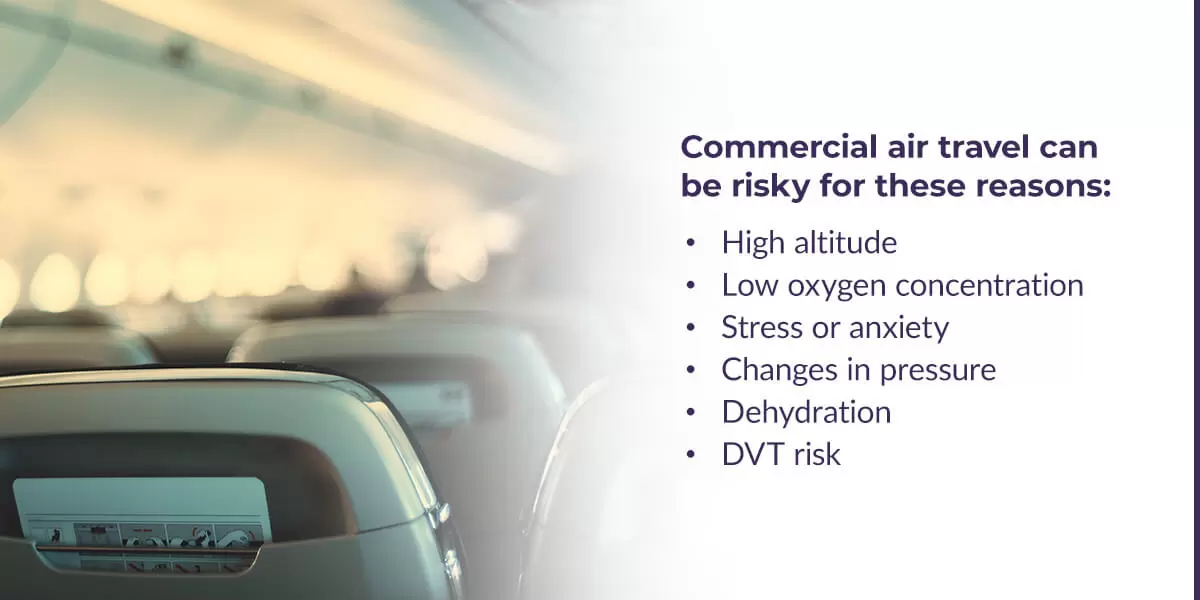
- High altitude: Flying in an airplane may have the same effect on your heart as visiting high-altitude locations. Patients who have certain heart conditions or high blood pressure may be more at risk for complications . Drastic changes in altitude can potentially worsen symptoms of existing heart conditions or lead to other heart events. Being at higher altitudes can put more strain on the heart.
- Low oxygen concentration: Airplanes, which travel at higher altitudes, also have reduced oxygen pressure. Sitting in the airplane cabin for hours means your body may not receive the optimal amount of oxygen, which can pose a risk for those with existing heart conditions like heart disease, CAD and pulmonary hypertension. Because there is less oxygen getting to your lungs on an airplane, your heart has to work even harder to pump blood to the rest of your body.
- Stress or anxiety: It’s common for people to feel general anxiety or stress about flying due to fear of heights or turbulence. Stress or anxiety can make your heart conditions worse or lead to a high heart rate, which may also prolong your recovery process.
- Changes in pressure: Passengers will feel pressure changes as the aircraft cabin altitude increases or decreases. This can cause gas to increase or expand in the body, resulting in pulmonary barotrauma . You may experience chest pain, a bloody nose or shortness or breath, which can lead to serious lung and heart damage if you’re recovering from open heart surgery.
- Dehydration: On long-haul flights, significant changes in fluid balance can occur due to controlled, dry air. Very low humidity can generally lead to faster dehydration, affecting your blood pressure. This can be problematic for those with heart disease, CAD, arrhythmia or heart failure.
- DVT risk: Sitting in a cramped plane cabin requires long periods of immobility and poor circulation. Combined with potential dehydration, you may be at a higher risk of developing a blood clot , which often forms in veins in the legs. This is also known as deep vein thrombosis (DVT). If you have an implanted heart device, artificial heart valve, arrhythmia, CAD or a coronary stent, your risk may be even greater. Blood clots can lead to a stroke or heart attack.
When flying after cardiac surgery, you may experience several of these risks at once, which could worsen the negative effects on your overall health.
Patients Who Are at Higher Risk

Your risk of complications, such as DVT, when flying after heart surgery may be greater if you have certain preexisting conditions like the following:
- Chronic obstructive pulmonary disease (COPD)
- Kidney disease
- Blocked arteries in the legs
- Heart or lung disease
- History of blood clots
- History of DVT
- Being on extended bed rest
- Having a catheter in a large vein
- Recent or current cancer treatment
- Having limited mobility
- Varicose veins
- Use of hormones, such as oral contraceptives or hormone replacement therapy
While some blood clots can dissolve on their own, and travel-related DVT is generally low , some clots can travel to your lungs. This may result in a blockage of blood flow and potentially lead to a pulmonary embolism, which can be fatal.
Your chances of these complications can also depend on your age. For example, older individuals may have a higher risk of developing blood clots than younger patients. People who smoke may also be more likely to experience post-surgical issues. The risks of experiencing complications during open heart surgery may be higher if the procedure is performed during an emergency.
You may receive medication to control your blood pressure or prevent bleeding and infection when flying after open heart surgery. This can reduce your risk of complications.
How Long Do You Have to Wait to Fly After Open Heart Surgery?
How soon after open heart surgery you can fly depends on your doctor’s recommendation about your overall condition and other factors. For example, if you’ve had a minimally invasive cardiac surgery with no complications, you may be able to fly within two to four weeks. For more moderate or intense open heart surgery, such as heart bypass surgery, you may need to wait four to six weeks .
If you had open heart surgery for a serious complication or other conditions that could potentially make certain activities during recovery more risky, you may have to wait six to eight weeks or longer. Every individual is different, but you should expect a minimum of two weeks before you can safely travel long distances. How long you have to wait to fly after open heart surgery also depends on how much you have healed and whether you have conditions that could put more strain on your heart and lungs while flying.
Tips for Traveling on an Air Flight After Cardiac Surgery
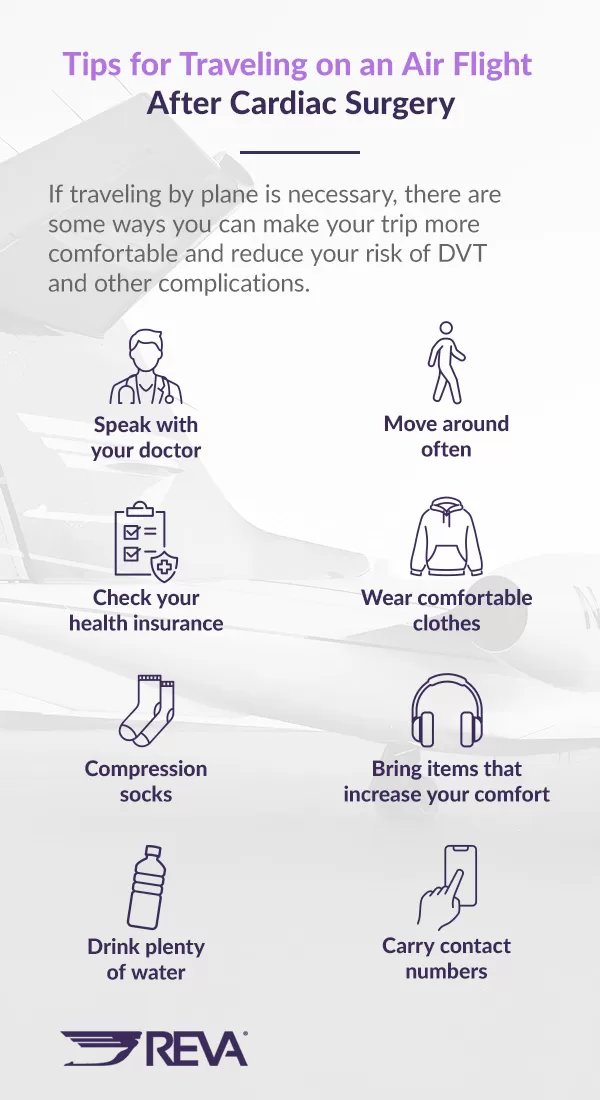
If traveling by plane is necessary, there are some ways you can make your trip more comfortable and reduce your risk of DVT and other complications.
- Speak with your doctor: Check that your prescriptions are up to date and that you have enough for your travels. Ask your doctor whether they can provide a letter describing your condition and any medications you currently take, including dosages. Your doctor will likely provide other essential information you need for your flight.
- Check your health insurance: Determine whether you are covered for travel. Some travel insurance policies may cover preexisting conditions like heart disease, but you may have to pay a higher premium. Contact your insurance broker to ensure you have health insurance coverage.
- Bring compression socks: Compression stockings, or high socks that reach just under the knee, can help you avoid blood clots in the legs during prolonged periods of sitting. Compression socks help improve blood circulation and lymphatic drainage in your legs, decrease swelling, and prevent low blood pressure when you stand up after several hours of sitting down.
- Drink plenty of water: Staying hydrated is essential no matter where you are, but it’s especially important during recovery and on a long flight. Because you’re likely to be more dehydrated on an airplane with dry air, be sure to drink plenty of water. Try to avoid coffee, soda, tea and alcohol, as these can dehydrate you more and may interact negatively with your medication.
- Move around often: Though you may not have tons of legroom, try to at least move your legs and feet for a couple of minutes each hour if you’re seated. If possible, walk up and down the aisles or go to the restroom to stretch your legs. Gentle stretching before your flight can also help with improving blood flow.
- Wear comfortable clothes: Wearing breathable, stretchy clothing can make for a better travel experience in general. Women can wear comfortable bras that are not underwired, especially while their breastbone is healing. Wearing tight clothing, like jeans, may restrict your movements on the plane.
- Bring items that increase your comfort: When traveling after heart surgery, you want to have everything you need for a worry-free flight. If you have anxiety about flying, bring headphones, a book or anything that will help make the time go by faster. You may consider getting a breathing pillow for strengthening the diaphragm and supporting optimal diaphragmatic breathing throughout the flight.
- Carry contact numbers: Whether you’re flying with someone else or alone, be sure to have the contact information of a local doctor, surgeon or specialist who knows about your condition and can assist airline employees and medical staff in the event of a complication.
What Are My Options for Flying Before or After Open Heart Surgery?
If you have a severe heart condition and need to travel for surgery or treatment immediately, flying may be your only option. While this is the quickest method, you will need to consider how to safely arrive at your destination before and after your surgery.
If you’re flying on a public commercial flight, you might consider flying with a medical escort. These trained and qualified professionals — who are also called flight nurses or patient escorts — will travel with you to ensure air travel safety. They will also provide any necessary medical care throughout your trip.
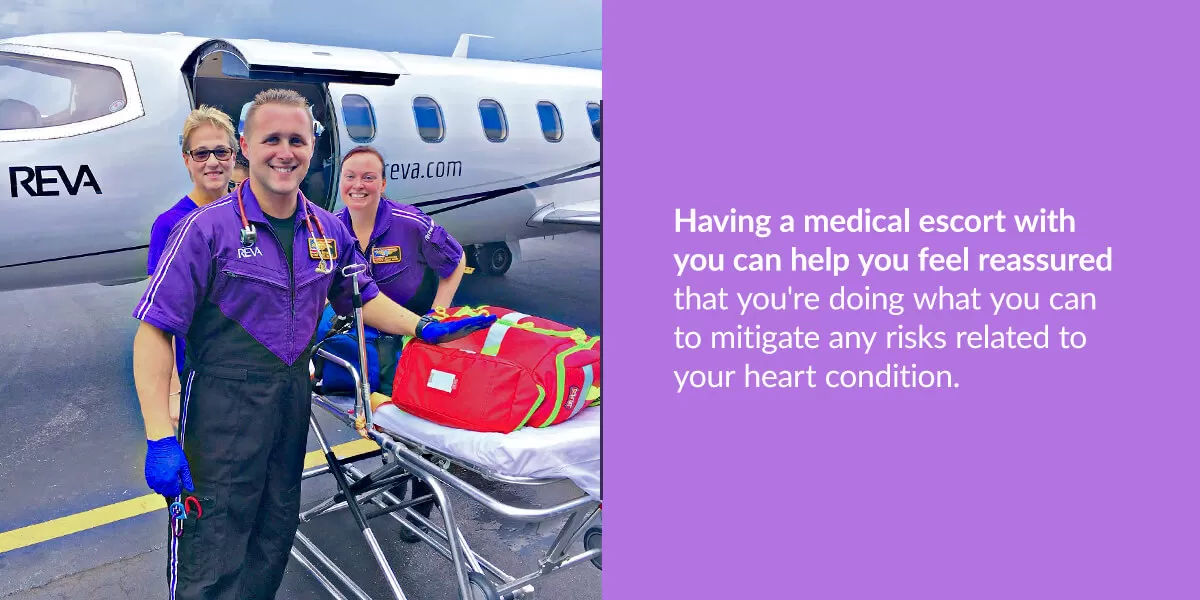
Having a medical escort with you can help you feel reassured that you’re doing what you can to mitigate any risks related to your heart condition. Whether you’re traveling short or long distances, a medical escort providing constant medical supervision can bring you peace of mind during emergency or non-emergency situations .
Another alternative is using a mode of private medical transport, like an air ambulance. If your condition is more severe, the risk of you experiencing worsening symptoms or a life-threatening emergency may be greater when flying on a commercial air flight alone. Because commercial flights are not equipped with knowledgeable medical personnel or life-saving equipment, flying in an air ambulance can be a safer way to travel. Private medical transport services can take you safely from bedside to bedside.
Whether you’re traveling to your surgeon or going home post-op, an experienced medical crew will be on board to mitigate health risks and provide medical attention if needed. In an air ambulance, the medical crew can even adjust the cabin pressure to avoid complications. Air ambulances are self-contained critical care units that can keep you comfortable and meet your needs.
Domestic Air Ambulance
International air ambulance, how air ambulances can help.
Air ambulances have the technology and medical devices to safely transport you from point A to point B. If you have a heart condition that requires care along the way, an air ambulance can make your experience more comfortable than a private aircraft.
While traveling with a medical escort on a commercial flight can be a suitable option, those who have more severe conditions or prefer to travel with more reassurance and security may find an air ambulance more ideal. You might also need an air ambulance if you:
- Need transportation to a specialized medical facility that is far away.
- Do not have access to public transportation where you reside.
- Are unable to drive yourself or fly unaccompanied due to your heart condition.
- Are flying with a commercial airline that has restrictions on the type of medication or oxygen container you have.
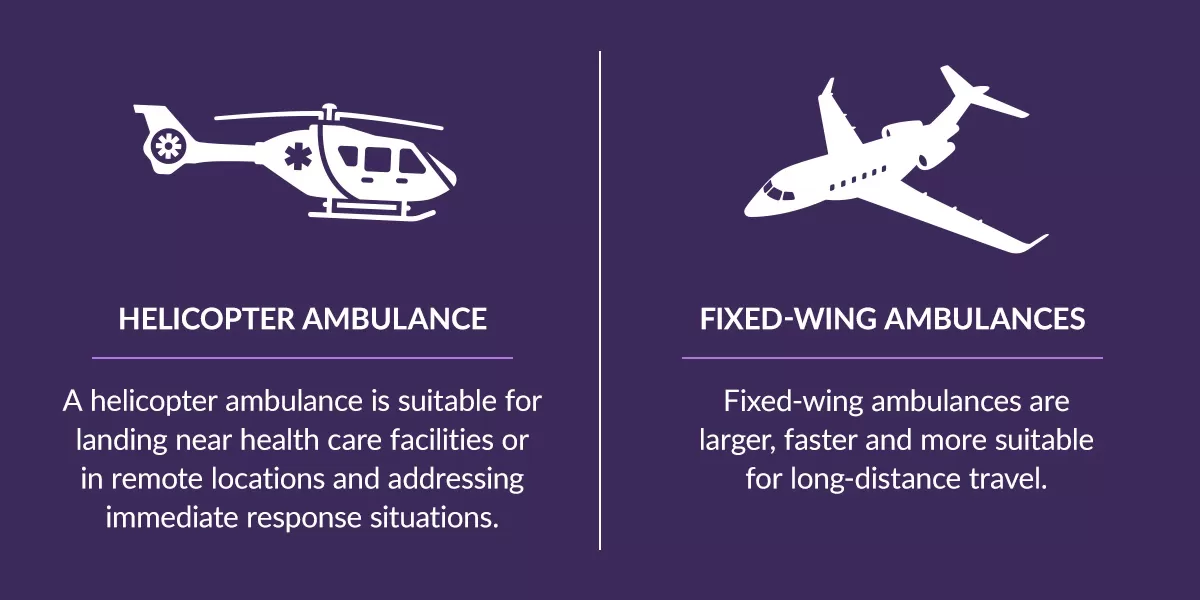
There are a few types of air ambulances that offer different benefits. A helicopter ambulance is suitable for landing near health care facilities or in remote locations and addressing immediate response situations. Fixed-wing ambulances are larger, faster and more suitable for long-distance travel.
Both types of air ambulances come equipped with specialized medical equipment and supplies, much like you would find in an intensive care unit (ICU). Some of this equipment includes:
- Monitoring devices.
- Life support systems.
- A wide range of medications.
You will also find paramedics, doctors and nurses on board your air ambulance who are prepared to handle critical care situations. If it seems like you or a loved one could benefit from safe, tranquil travel on a private air ambulance, know that providing potentially life-saving care is not the only advantage. Here are some other key benefits of using an air ambulance:
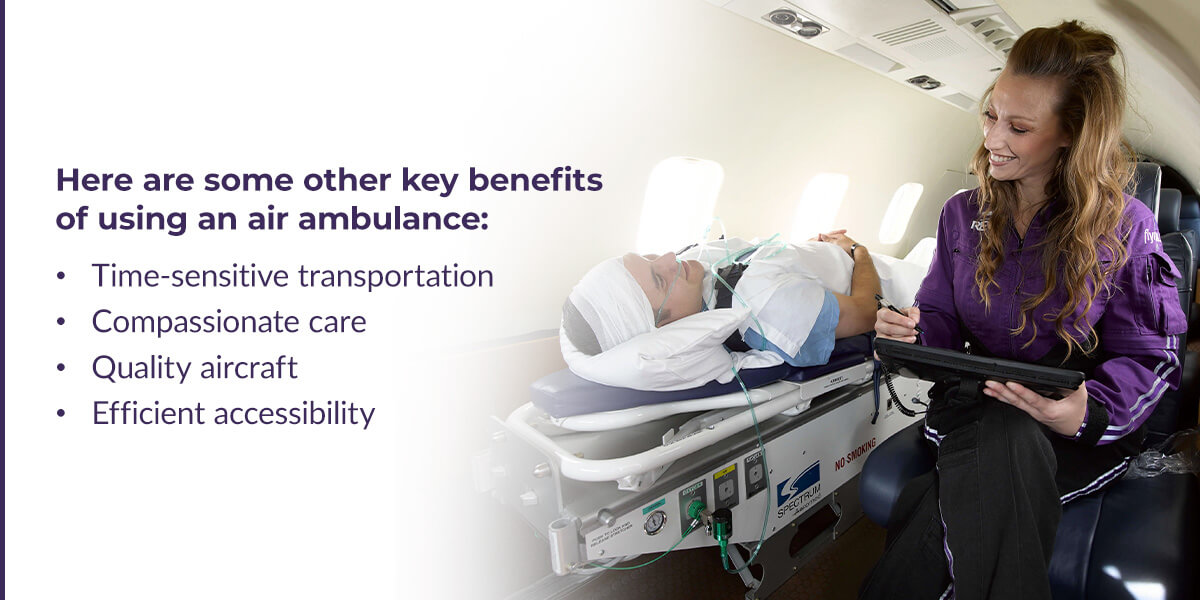
- Time-sensitive transportation: In a life-threatening situation, patients need a rapid response. Air ambulances can get medical teams to the individual for quick transport to a specialized facility that they may not receive in a local hospital. A fast response time with a fully equipped aircraft can improve patient outcomes and the chances of survival and recovery.
- Compassionate care: Medical personnel on air ambulances are highly trained and skilled, but they are also dedicated to helping patients before, during and after transport. Loved ones can also be notified of the patient’s health with updates from multi-lingual specialists for clear and consistent communication.
- Quality aircraft: Air ambulances maintain high safety standards, as they are specifically designed to provide medical care for a wide range of injuries and illnesses. Patients will have access to a comfortable and safe environment with high-quality equipment.
- Efficient accessibility: Whether a patient needs to be moved from a mountain to a medical facility or brought back home safely from a foreign country, air ambulances have the capability to quickly transport patients over long distances and access locations that may be too difficult for ground transportation.
Contact REVA for Smooth, Comfortable Medical Transportation
If you need to travel by plane before or after open heart surgery, know that you have options. REVA offers air ambulance and medical escort services that transport you to your destination to mitigate risk. Our experienced, compassionate professionals can get you where you need to be while enhancing your safety and comfort. From critical in-flight medical care to private ground transportation, it’s our goal to help you or your loved one prevent worsening conditions after major surgery.
Traveling with REVA means you can benefit from all the benefits of a private jet along with the latest medical equipment to give you the care you need while flying. At REVA, we offer both domestic and international air ambulance flights , where our friendly medical crew is ready to help you travel to and from treatment. Contact us today to request a free quote for our air ambulance or medical escort services.
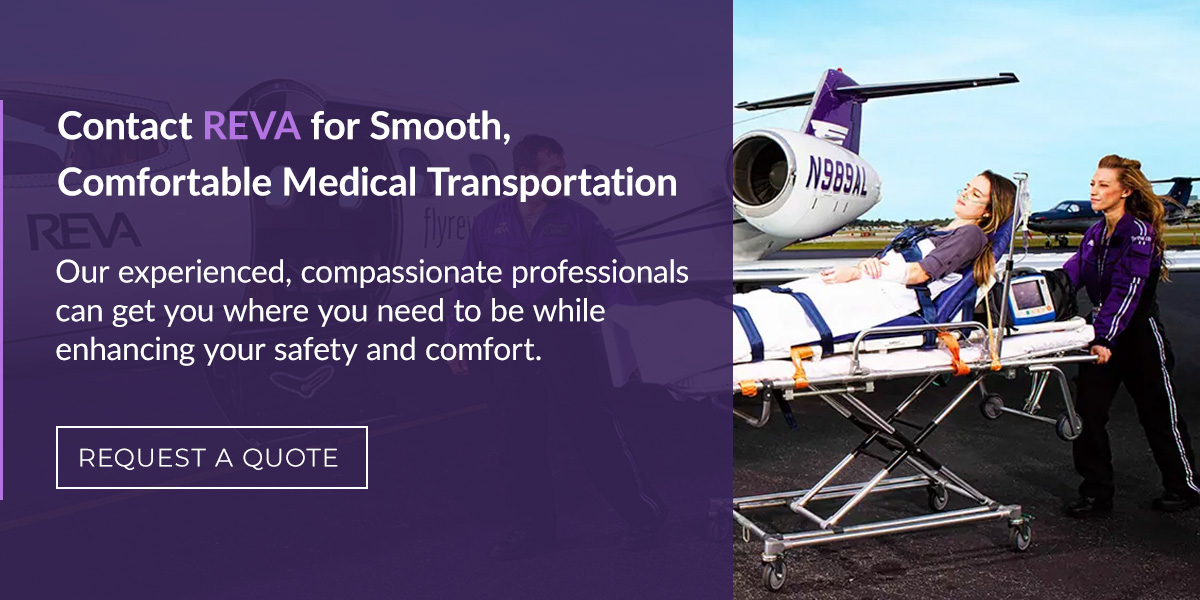
- Credit cards
- View all credit cards
- Banking guide
- Loans guide
- Insurance guide
- Personal finance
- View all personal finance
- Small business
- Small business guide
- View all taxes
Can I Get Travel Insurance for Pre-Existing Medical Conditions?

Many or all of the products featured here are from our partners who compensate us. This influences which products we write about and where and how the product appears on a page. However, this does not influence our evaluations. Our opinions are our own. Here is a list of our partners and here's how we make money .
Table of Contents
What is considered a pre-existing condition?
How to qualify for a pre-existing medical conditions waiver, where to find coverage for pre-existing conditions, travel insurance for pre-existing conditions, recapped.
Although trip delay and baggage loss insurance are good to have, purchasing a medical insurance policy before hitting the road can be the difference between an expensive vacation and a really expensive vacation. Those with pre-existing conditions may be wondering if they can still get travel insurance. Luckily, the answer is yes.
Here’s where to look for and how to get travel insurance for pre-existing medical conditions.
» Learn more: What to know before buying travel insurance
A pre-existing condition is an illness, injury or medical concern that has included exams, treatments or a change in prescribed medication within 60 to 180 days of purchasing a travel insurance policy. The condition doesn’t have to be diagnosed formally to be considered a pre-existing condition.
For example, say you go on a bike tour of Amsterdam and suffer a mild heart attack. If a doctor had diagnosed hypertension (high blood pressure) a few weeks before your trip, this is considered a pre-existing condition.
So, what does a pre-existing medical condition mean for travel insurance? The good news is that having a pre-existing condition doesn’t preclude you from traveling or being eligible for medical coverage. Many comprehensive plans cover pre-existing conditions and can help you recoup your money if you require medical treatment during your trip or have to cancel a trip altogether because of a medical issue.
To avoid being on the hook for medical bills abroad or losing a deposit before you even pack your bags, look for a policy that includes a pre-existing condition waiver. Read the fine print on the insurance provider’s website; there shouldn’t be an age limit on most plans, and the premium shouldn’t cost more than it would for people without pre-existing medical conditions.
As long as you’re medically fit to travel, you can qualify for a pre-existing condition waiver if you meet the following criteria and apply within the eligible timeframe:
A pre-existing condition must be stable.
You must buy coverage at the time of your first trip deposit or shortly thereafter (time frame varies by company).
Amount of coverage must be equal to all pre-paid, non-refundable costs.
For example, if you put down a 50% deposit on a safari in South Africa, you must buy travel insurance within the time specified by the insurance provider to be eligible for a pre-existing medical conditions waiver. If you wait too long to purchase coverage, you'll have missed the coverage purchasing window and the waiver won’t be applicable to your trip.
We recommend purchasing a travel insurance policy as soon as you make the first deposit on a trip.
If you don’t qualify for a waiver, then a travel insurance company has a right to look back at the traveler’s medical records for the last 60 to 180 days (varies by plan), which is called a look-back period. This is done to determine whether you’re filing a claim for an incident related to a pre-existing condition, which then determines whether it’s going to be covered or not.
The pre-existing medical conditions waiver may also provide coverage in the case of a non-traveling family member having a medical problem mid-trip. This varies by plan.
» Learn more: The best travel insurance companies
With so many providers to choose from, it’s hard to make the right choice. So, which travel insurance for pre-existing medical conditions is best?
You can turn to travel insurance companies such as Allianz , Travel Guard by AIG or RoamRight to locate the right plan for your trip.
Instead of getting quotes from every travel insurance company under the sun, we recommend InsureMyTrip, which is a free comparison site that allows you to get quotes from multiple providers at once.
To start a quote, you must:
Select your travel destination.
Provide travel dates.
Disclose your citizenship and the state where you live.
Select the number of travelers and their ages.
The website will ask you additional questions, such as:
Whether you’re taking a flight, going on a cruise or renting a vacation home.
The total cost of nonrefundable expenses, such as flight costs, hotel bookings and tours.
The date you made the first payment toward the trip and viewed your coverage options.
You can sort and filter your results in multiple ways. Compare the plans offered and make a selection based on price, insurance provider reviews or the included coverage.
Keep in mind that it’s not possible to find annual travel insurance for pre-existing medical conditions. Comprehensive plans that include coverage for pre-existing conditions can only be purchased for every trip separately.
Yes, it is possible to find travel insurance coverage suitable for trip takers with qualifying pre-existing conditions.
The best travel insurance options for travelers with pre-existing medical conditions include Travel Guard by AIG and Allianz .
Unless you purchase a plan with explicit coverage for pre-existing medical conditions, you can generally expect that costs related to these conditions pre- or mid-trip are excluded from a travel insurance policy. For plans with the option to cover pre-existing medical conditions, qualified travelers can select a Waiver of Pre-Existing Medical Conditions.
Example eligible conditions include illnesses, injuries or medical concerns that have included exams, treatments or a change in prescribed medication within 2-6 months of purchasing a travel insurance policy (depending on the provider).
The best travel insurance options for travelers with pre-existing medical conditions include
Travel Guard by AIG
Optional travel insurance certainly can protect you from the unexpected. To obtain coverage for a pre-existing condition, make sure to follow all the rules of the policy you’re about to purchase. Buy a policy within the specified time frame and declare all nonrefundable expenses accurately.
How to maximize your rewards
You want a travel credit card that prioritizes what’s important to you. Here are our picks for the best travel credit cards of 2024 , including those best for:
Flexibility, point transfers and a large bonus: Chase Sapphire Preferred® Card
No annual fee: Bank of America® Travel Rewards credit card
Flat-rate travel rewards: Capital One Venture Rewards Credit Card
Bonus travel rewards and high-end perks: Chase Sapphire Reserve®
Luxury perks: The Platinum Card® from American Express
Business travelers: Ink Business Preferred® Credit Card

on Chase's website
1x-10x Earn 5x total points on flights and 10x total points on hotels and car rentals when you purchase travel through Chase Travel℠ immediately after the first $300 is spent on travel purchases annually. Earn 3x points on other travel and dining & 1 point per $1 spent on all other purchases.
75,000 Earn 75,000 bonus points after you spend $4,000 on purchases in the first 3 months from account opening. That's $1,125 toward travel when you redeem through Chase Travel℠.

1x-5x 5x on travel purchased through Chase Travel℠, 3x on dining, select streaming services and online groceries, 2x on all other travel purchases, 1x on all other purchases.
75,000 Earn 75,000 bonus points after you spend $4,000 on purchases in the first 3 months from account opening. That's over $900 when you redeem through Chase Travel℠.

1x-2x Earn 2X points on Southwest® purchases. Earn 2X points on local transit and commuting, including rideshare. Earn 2X points on internet, cable, and phone services, and select streaming. Earn 1X points on all other purchases.
50,000 Earn 50,000 bonus points after spending $1,000 on purchases in the first 3 months from account opening.


Appointments at Mayo Clinic
Planning to travel with atrial fibrillation.
Take extra care when planning trips if you're living with AFib.
Atrial fibrillation — also called AFib — is a common heart rhythm disorder. If you have AFib , you may have some concerns about traveling with your condition. But taking a few steps to prepare may help you have an enjoyable and worry-free trip.
Before you travel, ask your health care provider any questions you have about traveling with AFib . Ask if there is anything you need to consider before and during your trip.
Travel tips with atrial fibrillation
Remember these helpful tips:
- Bring your medicines. Bring all of the medications you'll need for your trip. Keep them in your carry-on luggage.
- Carry a list of your medicines. Having a list of your medicines will make it easier to refill them if you run out of them or lose them.
- Take your time. Get to the airport early to give yourself plenty of time before your plane is due to depart. Anxiety can sometimes trigger irregular heartbeats.
- Bring your care provider's phone number. Write the number on a piece of paper. Also store the number in your phone when you travel.
- Ask about a medical alert bracelet. Your provider may recommend that you wear a medical alert bracelet that has information about your condition on it.
- Take steps to prevent blood clots. During your flight, stand and walk when you can to prevent blood clots in your legs. Your health care provider also may recommend that you wear compression stockings.
- Find medical centers close to your travel destination. Before your trip begins, learn where the closest hospital or doctor's office is at your destination. Find out what services your health insurance will cover. This can help prepare you in case of an emergency.
- Check the contact information for embassies. If you're traveling internationally, bring the address and contact information of the U.S. embassies or consulates in the countries where you'll be staying. They can help with medical care in the area and offer general advice.
- Buy travel health insurance. Buy travel health insurance and medical evacuation insurance before your trip in case of an emergency while traveling overseas.
- Watch for side effects of blood thinners. If you're taking warfarin (Jantoven), you'll need regular blood tests to monitor its effects. Check with your provider to see if you'll need blood tests while you're away. If you take other types of prescription blood thinners, continue to take the medicine as directed.
- Ask about high altitudes. If you're going to visit a high-altitude location, such as the mountains, check with your provider first. High altitudes may worsen some irregular heart rhythms. Your care provider may suggest that you rest and lower your activity level for several days after arriving at a high altitude. Also, watch for any new or unusual symptoms of your condition or of altitude sickness.
- Get recommended vaccines. Know which vaccines are required at your destination.
It's important to follow your atrial fibrillation treatment plan. If AFib isn't well controlled, it may lead to complications, including strokes and heart failure. With some planning, you can enjoy your travels and live an active life with atrial fibrillation.
There is a problem with information submitted for this request. Review/update the information highlighted below and resubmit the form.
From Mayo Clinic to your inbox
Sign up for free and stay up to date on research advancements, health tips, current health topics, and expertise on managing health. Click here for an email preview.
Error Email field is required
Error Include a valid email address
To provide you with the most relevant and helpful information, and understand which information is beneficial, we may combine your email and website usage information with other information we have about you. If you are a Mayo Clinic patient, this could include protected health information. If we combine this information with your protected health information, we will treat all of that information as protected health information and will only use or disclose that information as set forth in our notice of privacy practices. You may opt-out of email communications at any time by clicking on the unsubscribe link in the e-mail.
Thank you for subscribing!
You'll soon start receiving the latest Mayo Clinic health information you requested in your inbox.
Sorry something went wrong with your subscription
Please, try again in a couple of minutes
- Travel and heart disease. American Heart Association. https://www.heart.org/en/health-topics/consumer-healthcare/what-is-cardiovascular-disease/travel-and-heart-disease. Accessed Aug. 25, 2022.
- Tuttle T, et al. High altitude, air travel and heart disease. https://www.uptodate.com/contents/search. Accessed Aug. 25, 2022.
- Walls RM, et al., eds. High-altitude medicine. In: Rosen's Emergency Medicine: Concepts and Clinical Practice. 10th ed. Elsevier; 2023. https://www.clinicalkey.com. Accessed Aug. 25, 2022.
- Atrial fibrillation: Living with. National Heart, Lung, and Blood Institute. https://www.nhlbi.nih.gov/health/atrial-fibrillation/living-with. Accessed Aug. 25, 2022.
- Pack smart. Centers for Disease Control and Prevention. https://wwwnc.cdc.gov/travel/page/pack-smart. Accessed Aug. 25, 2022.
- Travelers with chronic illness. Centers for Disease Control and Prevention. https://wwwnc.cdc.gov/travel/page/chronic-illnesses. Accessed Aug. 25, 2022.
- Before you travel. Centers for Disease Control and Prevention. https://www.cdc.gov/travel/page/BeforeYouTravelInternationally. Accessed Aug. 25, 2022.
- Wang M, et al. Long-term high-altitude exposure does not increase the incidence of atrial fibrillation associated with organic heart diseases. High Altitude Medicine & Biology. 2021; doi:10.1089/ham.2020.0228.
Products and Services
- A Book: Future Care
- Newsletter: Mayo Clinic Health Letter — Digital Edition
- A Book: Mayo Clinic Family Health Book, 5th Edition
- Ablation therapy
- Atrial fibrillation
- Atrial fibrillation ablation
- Atrial fibrillation and managing stress
- AV node ablation
- Robot-assisted minimally invasive mitral valve repair at Mayo Clinic
- Cardiac ablation
- Caregiving for someone with atrial fibrillation
- Does atrial fibrillation run in families?
- Does older age increase the risk of atrial fibrillation?
- Echocardiogram
- Ejection fraction: What does it measure?
- Electrocardiogram (ECG or EKG)
- Heart palpitations
- Heart Rhythm Conditions
- Holter monitor
- Mayo Clinic Minute: Identifying and treating atrial fibrillation
- Low blood pressure (hypotension)
- Maze procedure
- Minimally invasive heart surgery
- Pregnancy and atrial fibrillation
- Pulmonary vein isolation
- Shortness of breath
- Should I make changes to my diet if I've been diagnosed with atrial fibrillation?
Mayo Clinic does not endorse companies or products. Advertising revenue supports our not-for-profit mission.
- Opportunities
Mayo Clinic Press
Check out these best-sellers and special offers on books and newsletters from Mayo Clinic Press .
- Mayo Clinic on Incontinence - Mayo Clinic Press Mayo Clinic on Incontinence
- The Essential Diabetes Book - Mayo Clinic Press The Essential Diabetes Book
- Mayo Clinic on Hearing and Balance - Mayo Clinic Press Mayo Clinic on Hearing and Balance
- FREE Mayo Clinic Diet Assessment - Mayo Clinic Press FREE Mayo Clinic Diet Assessment
- Mayo Clinic Health Letter - FREE book - Mayo Clinic Press Mayo Clinic Health Letter - FREE book
- Planning to travel with atrial fibrillation
Your gift holds great power – donate today!
Make your tax-deductible gift and be a part of the cutting-edge research and care that's changing medicine.
- 1300 409 322 Australian Based Call Centre
Can I get Travel Insurance if I have a Heart Condition?
Confused about how a pre-existing heart condition will affect travel insurance? We provide you with the information you need to know before buying a policy.

- Buying Travel Insurance With Heart Condition

In many cases, a pre-existing heart condition won’t stop you from wanting to travel and experience different cultures, activities, foods and landscapes.
While your heart condition might not factor too much into your travel plans (besides ensuring any medication you need is organised and packed, and you avoid activities your doctor has advised you to avoid) it can be important when it comes to whether or not you can be covered for a heart condition under your travel insurance policy.
Any heart condition, even those you may think are 'fixed' by a pacemaker or that are 'under control' with regular prescription medication, are still likely to be considered a pre-existing medical condition by your travel insurer.
However, this doesn't necessarily mean you shouldn’t purchase travel insurance, or that travel insurance won’t provide you with cover?
If you’re looking for travel insurance to protect you while you’re travelling but have a heart condition, you probably have a lot of questions.
Below we address some of the most frequently asked questions by travellers with heart problems, so that finding and understanding travel insurance is simple!
What do travel insurers consider a heart condition?
If you exhibit the symptoms of a heart condition, or have been diagnosed or treated for a heart condition at any time in your life, a travel insurer may consider you as having a ‘ pre-existing medical condition ’.
However, it really depends on the travel insurer .
When considering a travel insurer for your trip, you should always read their PDS to find out what they can and can’t cover, and whether or not they can provide cover for travellers with heart conditions.
Common heart conditions include:
- Coronary heart disease – the build-up of plaque inside the arteries.
- Deep vein thrombosis (DVT) – a blood clot in a vein, usually in the leg.
- Atrial fibrillation – a type of arrhythmia, where the heart does not beat in a regular rhythm.
- Cardiomyopathy – where the heart muscle becomes inflamed and enlarged.
- Angina – chest pain caused by lack of blood flow and oxygen to the heart.
- Prior operations – including valve replacement, stent procedures, and any other heart surgery.
Some important points to consider when travelling with a heart condition
The below is general advice only and is not intended to replace the advice from a medical practitioner or health care professional.
It’s important to be aware of your health and safety when travelling, especially if you have a pre-existing heart condition.
Before you travel, you may wish to consider some of the following:
The effects of high altitude
Travelling to countries at high altitude can result in heart complications. Lower oxygen levels can lead to breathlessness and an angina attack, for example.
Plane travel complications
Most popular travel destinations are a long flight away from Australia! Before you fly, visit your doctor to ensure you’re fit to travel by air. Some travellers with heart conditions are at higher risk of suffering from deep vein thrombosis (DVT) so research the exercises that can help prevent DVT in advance.
Bring extra medication and heart monitoring equipment
See your doctor before you travel to get advice about your prescription medications and going through airport security. They may advise you to inform a security guard if you have a pacemaker or implantable cardioverter defibrillator (ICD), so that you can opt for a pat-down or to be searched with a hand-held detector.
Also, be sure to pack information about your condition and enough medication for your trip, including an extra week or two just in case you are delayed in returning home.
Planning ahead is key
Consider your trip and the activities you want to do during your holiday. It’s important to be sure you don’t overexert yourself or engage in activities your doctor has advised against, or deviate from any diet you’re on to care for your heart health.
And remember to disclose any heart conditions when buying travel insurance, just in case!
Will travel insurers cover me if I have a heart condition?
Generally, you’ll find travel insurance companies will fall into one of three main categories when it comes to overseas medical cover for pre-existing heart problems:
1) Cover for pre-existing heart conditions.
Some travel insurers may offer cover for pre-existing heart conditions. If your heart condition is not automatically covered by your travel insurer , you may be able to add cover for your heart condition by completing a medical screening . If your travel insurer approves cover for your heart condition, you may need to pay an additional premium for your heart condition to be listed on your certificate of insurance as a covered condition .
2) No cover for your heart condition, but other overseas medical emergencies are still covered.
If you look at the insurer’s Product Disclosure Statement (PDS), they may not include cover for heart conditions at all, even at the cost of an additional premium. However, this may not exclude you from medical cover completely. You may still be offered cover for emergencies unrelated to your heart condition such as breaking a bone in a bad fall or traffic accident, getting a severe stomach bug, or picking up an unexpected illness.
3) Your heart condition may exclude you from overseas medical cover altogether.
In some cases, a travel insurer may not provide you with ANY medical cover because of a pre-existing heart condition, even if you have had corrective surgery or that heart condition is being managed by medication. One common example is if you are taking Warfarin or a similar blood-thinning medication after a heart surgery. Some travel insurers will not provide you with medical cover due to the perceived risk.
To find out if your travel insurer will provide you with overseas medical cover, you should read their PDS, which will outline the pre-existing medical conditions that can be covered either automatically or by paying an extra premium, the steps that you need to take to see whether your condition can be covered under your policy, and which medical conditions are excluded.
You can never predict what will happen when you travel, so it’s important to review the Product Disclosure Statement (PDS) carefully to make sure you have the cover you require for your travels is in place for any unexpected complications or emergencies overseas.
Do I have to do a medical assessment every time?
Whenever you take out a travel insurance policy, you have a duty of disclosure to respond to any questions that the travel insurer asks honestly, accurately and completely, about your existing medical conditions , so you will most likely need to complete a new medical assessment with updated accurate and complete medical information each time you purchase a policy.
Every travel insurer is different, so contact your travel insurer or read their PDS to see what they need for you to do to include cover for your heart condition under the policy.
How much cover can I expect to get for a heart condition?
The level of cover you receive can vary between insurers. Overseas medical cover for heart conditions may be unlimited, or capped to a certain amount depending on the condition or other factors such as age.
Be sure to read the insurers Product Disclosure Statement (PDS) to find out the amount of cover you’ll receive for a heart-related medical emergency.
What happens if I don’t declare a heart condition to my travel insurer?
If your pre-existing medical condition isn't automatically covered and you don’t declare it if the travel insurer requires you to, it is unlikely that you'll be covered for any claims arising from or related to that condition.
Some travel insurers may require you to declare any new medical conditions, or any changes to your existing medical conditions that occur after you purchase your policy and up until your trip departure date.
It won’t matter how ‘unexpected’ having a problem related to the pre-existing medical condition may seem when you purchase the policy.
Any pre-existing medical condition is an added risk taken on by the insurer, so if you haven’t declared a heart condition, the insurer may decide to refuse to provide financial cover if you need to see a doctor, go to hospital or be medically evacuated from your holiday destination due to a heart problem.
Overseas treatment and hospitalisation in any country can result in your holiday costing hundreds or thousands of dollars more than expected.
If you’re in a country such as the United States or Japan, healthcare can be extremely expensive. You don’t want to be slapped with a huge medical bill when you could have had a travel insurance in place to cover you, so it’s important to research your policy options before making a purchase, and declare any pre-existing medical conditions that you are required to declare in accordance with the travel insurance policy requirements .
What if I had a heart attack, heart valve replacement or stroke before, but I’ve recovered?
If you’ve had a heart attack or other complication with your heart before, you should still declare it to your travel insurer. It’s important to make sure you’ll have cover in place in case you experience any complications or if your pre-existing medical condition re-emerges while overseas.
Different travel insurers have different time periods for pre-existing medical conditions. Some require you to disclose medical conditions that you’ve had for 5 years up until your policy purchase date, while others may require you to disclose any medical condition you’ve had even longer .
At Fast Cover, travellers are required to declare medical conditions that they have had within the 3 years prior to their policy purchase date, and for any changes in health, including new medical conditions, from the date of policy purchase up until the date of departure.
If you’ve had a heart attack or other complication with your heart, on blood thinning medication following a stroke or heart attack, or had a valve replacement within the time period as set by your travel insurer you may need to declare it to your travel insurer in accordance with their policy requirements, even if you’ve recovered, or your condition is under control . It’s important to know if you will have some protection , just in case you experience any complications or if your pre-existing medical condition re-emerges while overseas.
How do you declare a pre-existing heart condition?
Travel insurers offer different methods for disclosing pre-existing medical conditions. They may require you to complete an online medical screening or over the phone.
Once you’ve completed the medical screening, your insurer will let you know if you can be covered by one of their policies, as well as how much this might cost.
You should also be made aware of any exclusions that apply to your policy and your level of excess which is the amount you’ll have to pay first before the insurance provides financial assistance.
Fast Cover offers medical screening for your existing medical conditions. Check out their Medical Conditions page for more information about medical screening for your medical conditions including definitions of what Fast Cover considers to be a medical condition that needs to be declared, as well as General Exclusions that may apply.
If I’m a senior, will travel insurance for heart conditions cost more?
The cost of travel insurance usually goes up the older you get. This is generally because senior travellers are at higher risk of becoming sick or injured.
Seniors may also have more pre-existing conditions than younger travellers which means purchasing travel insurance which provides cover for a pre-existing heart condition is likely to be more expensive for a senior.
When you purchase travel insurance for senior travellers , be sure to check if there are any age restrictions for particular activities such as skiing or snow sports , and if there’s an age restriction on the cover for your pre-existing medical conditions.
What sort of questions are in a medical assessment for a heart condition?
The type of questions asked will vary between travel insurers, and may include:
- What is the medical term of your heart condition?
- What treatment or prescription medications are you currently taking?
- Have you had any recent changes to your treatment or medication?
- When did you last see a medical practitioner?
- Have you undergone treatment in hospital?
- Are you waiting to have your condition or treatment reviewed?
These questions will allow the travel insurer to assess your existing medical condition, decide whether to offer cover for your existing medical condition or decline cover , and calculate the additional premium that you may have to pay for your heart condition to be covered.
All pre-existing conditions such as diabetes, high blood pressure, high cholesterol, lung or chest infections can also affect your heart health and are important to disclose as well.
So, whether you have angina, are taking any prescription medications (including aspirin) following a heart attack or stroke, have had a heart valve replaced or any other heart condition, always remember to declare it to your travel insurer if they require you to do so in accordance with policy requirements . .
Always remember to read through the insurer’s Product Disclosure Statement (PDS) carefully. This will mean you know what you are and aren’t covered for before purchasing a policy.
Please note any advice is general advice only and does not take into account the customer’s individual needs, objectives or financial situation. Please consider the PDS prior to purchasing a policy to decide whether this product is right for you. Policies are subject to eligibility criteria, terms, conditions, exclusions, sub-limits and limits.

About the author
Laura is a content writer at Fast Cover. Fuelled by a passion for adventure travel and inspired to learn more about the world, she specialises in writing about travel insurance and health topics which are published across numerous travel forums and websites.
Need affordable travel insurance?
Recommended.
Travel Tips & Hacks
How to Save on Travel
Travel Health Guides
Everything Travel Insurance
Travel Alerts & News
Staying Safe Overseas
We respect your privacy, see our Privacy Policy for more information.
Free Spirit
Medical Travel Insurance With No Age Limits
- Search for:

Specialist travel insurance
Any health condition that relates to your heart is likely to be significant. That’s why so many standard travel insurance companies will not offer holiday insurance to people who have medical conditions such as heart valve disease .
Despite the fact that many people with cardiac valve disease manage their condition well through medication, the possibility of medical treatment costs being incurred abroad means that many travel insurance policies won’t cover people with heart valve disease.
Yet, having a serious condition such as this probably means you need a holiday more than most. At Free Spirit, we work hard to ensure that in most cases we can provide you with specialist travel insurance that covers your cardiac valve disease.
What does specialist travel insurance for cardiac valve disease cover?
If you are managing heart valve disease with medication or if you have recently had surgery, our medical travel insurance should be able to cover you. Please note, that you will be required to complete a medical screening online or over the telephone so that we can confirm if we are able to offer cover. In 96% of cases, we are able to offer cover to people with medical conditions.
Having our specialist travel insurance in place means that should you require emergency medical treatment whilst on holiday, the costs will be covered (subject to the terms and conditions of the Free Spirit Insurance Policy ). This is good to know when you are travelling abroad with a medical condition as emergency hospital treatment can be very expensive, especially in places such as Spain, Cyprus and the USA.
What’s more, travel insurance for heart valve disease also covers you for unexpected cancellations. You may have been well when you booked your holiday but then find yourself too ill to travel nearer the time. If you have taken out medical travel insurance when you booked your holiday, then you will be able to recover some of the money you have already paid out should you need to cancel (subject to the policy terms and conditions). We will also cover the cancellation costs of the people you are travelling with, as long as they are on the same Free Spirit policy as you.
How do I get medical travel insurance to cover my cardiac valve disease?
Getting travel insurance from Free Spirit couldn’t be easier. We know that having a long-term medical condition such as heart valve disease means you are constantly having to answer questions about your condition – so we try to make this process as straight-forward and simple as we can.
To find the right policy for you which gives you all the cover you might need, we’ll just ask you some questions about your heart valve disease. Our friendly team are available on freephone 02392 419 080. Alternatively, you can choose to do the whole process online by going to get a quote online section.
What questions will we ask you during the medical screening process?
Typical questions we will ask someone who is seeking specialist travel insurance to cover their heart valve disease are as follows:
- Have you had surgery to repair or replace a heart valve?
- Have you ever been a smoker?
- Is further investigation or treatment planned?
- Have you ever had any disturbance of your heart rhythm?
- Are you on medication to thin the blood (excluding aspirin)?
- Do you have any breathlessness as a result of your heart problems?
- Have you ever been told that the arteries in your heart are blocked or narrowed?
- Have you ever had angina and/or a heart attack?
If you are not sure of any of the information you are giving us or do not know the answer, please check with your treating G.P.
Travelling when you have heart valve disease
Before planning any holiday, it’s important to discuss with your doctor where you want to go and what you plan to do, to ensure they are happy for you to do so. Having cardiac valve disease can mean you get out of breath easily and feel unusually tired, so having a relaxing holiday where you can soak up the sun may be ideal.
If you are flying to your destination you may need to book assistance at the airport. Your required gate may be a long walk, but with assistance, that burden can be eased and airport transportation can take you to where you need to be.
Make sure you have all the medication you need with you. We also advise that you have a short explanation of your condition, either written by yourself or your doctor, in the language of the country you are travelling to. In the event that you need hospital treatment in an emergency, this explanation can save a lot of time and ensure you get the right treatment as quickly as possible.
Of course, being able to relax and enjoy your holiday is only really possible if you know that you are covered for your medical condition. Having specialist medical travel insurance in place will help give you the peace of mind you need for a well-deserved break. Contact us today for a quote.
CUSTOMER REVIEWS
Read reviews
USEFUL INFORMATION
- Why Choose Us
- Insurance Policy
Testimonials
We were pleased with our Free Spirit travel insurance quote as we thought it would be more expensive with our medical conditions.
I would just like to say how impressed I have been with the way the business has been conducted and my compliments to Emma and Lauren that I have been…
It was nice to find that my initial enquiries dealt with in a pleasant, efficient manner when I bought an annual travel policy. Though I was sad to ha…
Travel Insurance with Pre – Existing Medical Conditions is becoming more difficult to get as one gets older. I found all the members of staff I spoke …
I found the operators to be very knowledgeable and sympathetic and I would certainly recommend you to others. It is about more than just insurance to …
I needed a Travel Policy that was going to cover me and the family for my recent trip to Turkey and also provide cover for my medical condition. I cho…
I wanted to commend you on a very pleasant and courteous customer service operator I spoke to regarding my travel insurance cover. Having numerous exi…
From the moment I contacted you for travel insurance for my husband and myself it was a positive experience. The questions we were asked relating to o…
I have left two testimonials already but feel it important and necessary to add a third. I have a pre-existing medical condition, which other insuranc…
Last year my travel insurance went up by one-third just because I was 70 and when I asked my previous Insurer why, I was told I was more likely to hav…
- Read Reviews
Ask The Team
You can read our Q&As or ask a question directly. Read Q&As

Stay in touch
Our newsletter gives you the freedom to travel with confidence. Tips, hints and guides – along with the occasional special offer – straight into your inbox. Sign up today!
Telephone Hours
Opening Hours
- Mon-Fri: 8:30am - 8pm
- Sat: 9am - 5:30pm
- Sun: 10am - 5pm
Bank Holiday Opening Hours:
- 6th May: 9am-5pm
- 27th May: 9am-5pm
- Mon-Fri: 9:00am - 8:00pm
- Sat: 9:00am - 5:30pm
- Sun: 10:00am - 5:00pm
After Surgery Travel Insurance
Sometimes a holiday is exactly what you want and need after surgery. If your doctor has said you are Fit to Travel, then AllClear can help with the right travel insurance. Travel with peace of mind knowing that you have comprehensive cover, including medical emergency and cancellation cover. Get a quote from AllClear today.
Page contents
Going on your holidays after you’ve had surgery, post surgery patients and travel insurance, travel insurance after surgery: things to think about before you get your quote, waiting list cover, frequently asked questions, travelling after surgery.
Surgical procedures have developed rapidly over the last 20 years. Many surgeries now use local anesthetic or keyhole surgery, which is far less invasive, or even laser surgery. This means that complex procedures can be performed with minimal impact on you as a patient. All this can speed up your recovery time, and you might see a holiday as a perfect way to get the post-surgery relaxation that you need. Rightly so, but it’s more important to make sure you are fully covered for travel insurance after surgery.
At AllClear we’re committed to providing everyone a quote, especially if you are unable to obtain travel insurance elsewhere. This means if you’ve recently had surgery, you should consider one of our specialist travel insurance policies.
The risks of making a claim
When you get a quote, the online medical screening process will monitor the risks of you needing to make a claim. You could be claiming to cancel your holiday or because you need emergency medical treatment while you’re away. Therefore, if you’ve had an operation recently, there will be certain risks which will be taken into account during the quote process.
Declaring the surgery you have had
Please note, you will not need to declare the surgical procedure directly. Instead, you will need to declare the medical condition that you needed the surgery for. Afterwards, the quote process will ask related questions – which might include questions about having surgery, but not always. For example, if you are looking for travel insurance after heart surgery, you should declare the heart condition(s) that you have.
The importance of comprehensive cover
It’s important that you are fully covered after your surgery, in case you have a medical emergency when away. The 24-hour emergency assistance team will then be on hand to help you make any emergency arrangements you might need. This is especially useful if you have no local knowledge and don’t speak the language of the country you are visiting. The medical emergency assistance company will liaise on your behalf with the doctors and service providers, saving you hours of potential hassle and worry. You will also be avoiding thousands of pounds in potential bills, should the worst happen when you’re far from home.
Benefits of AllClear Cover
- Before taking out a policy that provides you with travel insurance after surgery, it’s vital that you get confirmation from your doctor that you are fit-to-travel.
- If you already have an annual multi-trip policy in place, have had surgery, and are now considering going on holiday again, you should check with your doctor that you are considered fit-to-travel once more. If you travel against the advice of a doctor or medical practitioner you could invalidate your cover which may mean any claim will be rejected.
- It’s essential that you declare all of your pre-existing medical conditions to us . Including the medical condition for which you have required surgery.
- Your travel insurance will cover the cost of any emergency medical treatment that is necessary whilst you are away. You should be aware, however, that if you’re travelling for the purpose of receiving medical treatment abroad, you won’t be covered.
As long as you have been declared fit-to-travel we could offer you a quote. So whatever medical conditions have caused the need for surgery, you can get specialist travel insurance that takes care of your needs.
In some cases, your medical condition may require multiple surgeries. This might mean you are on a waiting list for treatment. However, with many policies you will not be covered for cancellation if you need to cancel for that reason.
However, you have the option to add Waiting List Cover to AllClear Gold and Gold Plus policies . This means you will be covered if you need to cancel or cut short your trip because of being on a waiting list, for example if the date of your operation coincides with your travel dates.
During your quote, you’ll be asked if you are on a waiting list during our medical warranty questions. When you answer ‘yes’, you will only be offered policies that are suitable.
Waiting list cover is only available on single trip policies.
Second year with this company. After having heart surgery found they asked relevant questions which were easy to answer. Paperwork arrived really quickly. Would recommend to anyone with a pre existing condition. Mrs Elizabeth Ganly
You had surgery last month. Will you be able to get travel insurance?
In principle, yes, providing you are fit to travel. Make sure you declare the condition for which you had the surgery when getting your quote, and then answer the medical screening questions. Any answers you need to provide about the surgery will be covered there. You need to declare all conditions or you won’t be covered if you need to make a claim.
What do you do if you need emergency treatment when you're away?
Firstly, don’t worry. Call the emergency medical phone number as detailed in your policy booklet. You will speak to a 24-hour emergency medical assistance team which provides multilingual support to help you get to the nearest hospital. They will follow your treatment all the way to ensure you get the care you need.
You’re taking medication following your surgery, is it included in your travel insurance policy if it gets lost or stolen?
Yes, an AllClear Gold or Gold Plus policy will cover you for loss of medication up to £300.
If you fall ill just before travelling, will you be covered for cancellation?
Yes. You will need to have declared your medical condition that required the surgery, plus any other pre-existing medical conditions, at the time of buying your policy. Your doctor will have to have passed you as medically fit to travel at the time.
Simple 3 step quote process
1. call us or click a quote button on our site, 2. complete our simple medical screening process, 3. get your quotes, our 5 star trustpilot rating, read allclear trustpilot reviews.
There are a number of different types of surgery, each of which will place its own demands on the body and affect your recovery time. No person and no operation are all the same. Therefore, as well as getting your travel insurance after surgery quote, there are a number of things you might want to thing about when planning a holiday after surgery. We have put these tips together:
Think about how active you want your holiday to be
- If you are recovering from a minimally invasive procedure like laser eye surgery you may be able to be a lot more active than a more major operation. Your doctor or consultant should be able to help guide you in these decisions.
Your airline may restrict when you can travel after surgery. Make sure you check with your medical team and the airline as early as you can. Some operations, like joint replacements, might limit air travel for 3 months or more. As a rough guide, the Civil Aviation Authority (CAA) says that before flying, you should allow:
- one day after simple cataract or corneal laser surgery.
- one day after a colonoscopy .
- one to two days after keyhole surgery.
- four to five days after simple abdominal surgery.
- seven days after more complicated eye surgery
- 10 days after chest surgery or a coronary artery bypass graft .
- one to two days after surgery where a plaster cast is applied – if you have a broken arm or leg, it will affect where you can sit; for example, you won’t be allowed to sit in an emergency seat and you may have to purchase an extra seat if you cannot bend your knee to sit normally.
- two to six weeks after surgery for retinal detachment that involves having a gas bubble put in your eye.
- If you are travelling after you have had a pacemaker fitted, check out our specific page for more information.
Risk of DVT
If you’re flying after recent surgery, especially on the hips or knees, you’re at an increased risk of deep vein throbosis (DVT) , a blood clot in one of the deep veins in your body, usually in your legs. Other factors may also increase your risk of DVT, including if:
You’ve had blood clots before.
Your family has a history of blood clots.
You are overweight or obese.
You are pregnant.
If you’re at high risk of DVT, you can speak to your GP. They may get advice from your surgeon. You can take steps to reduce your risk of DVT, such as drinking plenty of water and moving around on the plane. According to the NHS website , the risk of developing a travel-related DVT is low, even if you’re classed as moderate to high risk.
Destination choices
- Avoid travelling to an area with poor sanitation or high rates of infectious diseases. Your immune system may be temporarily less robust following your surgery. You may have a reduced ability to fight off infections.
Written by: Russell Wallace | Travel Insurance Expert Last Updated: 8 March 2024
† Based on Trustpilot reviews of all companies in the Travel Insurance Company category that have over 70,000 reviews as of January 2024. AllClear Gold Plus achieved a Which? Best Buy.
Policy Wordings
Modern Slavery Statement
MaPS Travel Insurance Directory
Earn rewards by sharing with friends

Introduction to HTH Worldwide Travel Insurance
- Plans Available
- How to Purchase and Manage Your Policy
HTH Worldwide Customer Service and Support Experience
Compare hth worldwide travel insurance.
- Why You Should Trust Us
HTH Worldwide Travel Insurance Review 2024
Affiliate links for the products on this page are from partners that compensate us (see our advertiser disclosure with our list of partners for more details). However, our opinions are our own. See how we rate insurance products to write unbiased product reviews.
No one likes to think about what could go wrong on vacation, but the truth is that anything can happen. That's why travel insurance is so important — it can help you recover from any unexpected emergencies that may occur while you're away from home.
If you're looking for a reputable travel insurance company, HTH Worldwide Travel Insurance is a great option. It's been in business for over 20 years and offers three different travel insurance plans. Whether you need basic coverage or more comprehensive protection, HTH Worldwide likely has a plan that will suit your needs.
- Check mark icon A check mark. It indicates a confirmation of your intended interaction. Three plans to choose from
- Check mark icon A check mark. It indicates a confirmation of your intended interaction. Reasonable premiums
- Check mark icon A check mark. It indicates a confirmation of your intended interaction. CFAR coverage available with some plans
- Check mark icon A check mark. It indicates a confirmation of your intended interaction. High medical emergency and evacuation coverage
- con icon Two crossed lines that form an 'X'. Special coverages for pets, sports equipment, etc not available
- con icon Two crossed lines that form an 'X'. Limited reviews with complaints about claims not being paid
- Trip cancellation of up to $5,000 with the Economy plan and up to $50,000 with the Preferred plan
- Cancel for any reason insurance and missed connection insurance available with the Preferred plan
- Baggage delay insurance starting after 24 or 12 hours depending on the plan
HTH Worldwide is a travel insurance company owned and operated by Worldwide Insurance Services, which also operates GeoBlue Travel Insurance . In fact, many of the policies listed on HTH Worldwide's website are actually provided by GeoBlue, specifically its travel medical insurance . While we'll talk about those policies here, you can find more details in our GeoBlue review .
HTH Worldwide's stand-alone products are its TripProtector trip cancellation policies. These offer comprehensive protection with relatively low premiums compared to many of its competitors. In fact, HTH Worldwide is among the companies included in our picks for the best cheap travel insurance .
That said, with the premiums you're paying, you'll encounter some concessions. For one, HTH Worldwide's coverage limits are far below that of many of the best travel insurance companies, particularly when it comes to trip cancellation limits, which start at $5,000 per person for its Economy plan.
Types of Policies Offered by HTH Worldwide
HTH Worldwide offers three primary plans: TripProtector Economy, Classic, and Preferred. Each plan has different coverage levels and features, so you can choose the one that best fits your needs. But they'll all cover (up to a specified amount) things like trip cancellation and interruption, emergency medical expenses, lost or delayed luggage, and more.
One important note, though, is that the TripProtector Economy plan is not available for trips where the per-person cost is greater than $5,000.
Below you'll find the per-person coverage limits of HTH Worldwide's three travel insurance plans:
These policies also include 24-hour emergency hotline service, an online database to search for doctors while you're traveling, a medical term translation database, and health and security news alerts.
Additional Coverage Options from HTH Worldwide
In addition to the three primary plans, HTH Worldwide also offers the following two plans, through GeoBlue, for travelers only looking for travel medical coverage:
- Single-trip option for travelers with primary health insurance: HTH Worldwide provides a short-term international medical plan for those who have other travel insurance but need travel medical coverage. It covers pre-existing conditions and medical evacuation costs, with maximum benefit amounts ranging from $50,000 to $1 million and deductibles from $0 to $500.
- Single-trip option for travelers without primary health insurance: This plan for travelers who don't have primary health insurance has maximum benefit amounts ranging from $50,000 to $1 million and deductibles ranging from $0 to $500. It covers pre-existing conditions for medical evacuation.
- Multi-trip option: This annual travel insurance plan is for people who are taking multiple sub-70-day trips within a 12-month period.
The following two plans listed on HTH Worldwide's website, also supplied by GeoBlue, are designed for people who live or work outside their home country:
- Xplorer plan: This plan is for individuals and families who intend to be outside their home country for more than three months per year.
- Navigator plan: This plan is specifically for students, faculty, mission, and maritime crews who will be outside of their home country for more than three months during the year.
Like other travel insurance providers, HTH Worldwide offers additional coverages that can be purchased along with the primary policy. These add-ons are only available for a Preferred plan, not an Economy or Classic plan.
The add-ons include:
- Cancel for any reason (CFAR): Will pay 75% of any prepaid trip expenses. You must purchase coverage within 21 days of your first trip deposit, and the trip must be canceled at least two days before your scheduled departure. This add-on is only available for TripProtector Preferred.
- Collision Damage Waiver (CDW): Coverage for your rental car in the event of damage due to crash, theft, vandalism, windstorm, fire, hail, flood, or any cause beyond your control. (Not available in NY, OR, or TX.)
HTH Worldwide Travel Insurance Cost
The premium you pay will depend on various factors, including the age of the travelers, destination, and total trip costs. The average cost of travel insurance is 4% to 8% of your travel costs.
After inputting some personal information, such as your age and state of residence, along with your trip details, like travel dates, destination, and trip costs, you'll get an instant quote for HTH Worldwide plans available for your trip. And from there, it's easy to compare each option based on your coverage needs and budget.
Now let's look at a few examples to estimate HTH Worldwide coverage costs.
As of 2024, a 23-year-old from Illinois taking a week-long, $3,000 budget trip to Italy would have the following travel insurance quotes:
- TripProtector Economy: $93.16
- TripProtector Classic: $115.56
- TripProtector Preferred: $156.20
Premiums for HTH Worldwide plans are between 3.1% and 5.2% of the trip's cost, well within the average cost of travel insurance.
HTH Worldwide provides the following quotes for a 30-year-old traveler from California heading to Japan for two weeks on a $4,000 trip:
- TripProtector Economy: $121.41
- TripProtector Classic: $149.43
- TripProtector Preferred: $200.75
Once again, premiums for HTH Worldwide plans are between 3% and 5% of the trip's cost, within and below the expected range of travel insurance costs.
A Texas family consisting of two 40-year-old parents with a 10-year-old and 4-year-old on a two-week trip to Australia for $20,000:
- TripProtector Economy: $610.74
- TripProtector Classic: $743.15
- TripProtector Preferred: $995.04
HTH Worldwide plans cost between 3% and 5% of the trip's cost, below and within the average cost of travel insurance.
A 65-year-old couple looking to escape New Jersey for Mexico for two weeks with a trip cost of $6,000 would have the following quotes:
- TripProtector Economy: $324.95
- TripProtector Classic: $389.12
- TripProtector Preferred: $474.12
Premiums for HTH Worldwide plans for older-age travelers are between 5.4% and 7.9%, which is well within the average cost for travel insurance. While it's certainly more expensive than coverage for younger travelers, it's on the lower end of what travel insurance companies often quote for older travelers.
How to Purchase and Manage a HTH Worldwide Policy
It's fast and simple to get a quote from HTH Worldwide. Visit its website and provide basic information about your trip. You'll receive an immediate quotation for the insurance plans available for your journey, so it's simple to compare each one. Make sure you have all of the following information on hand:
- Primary destination
- Age of traveler(s)
- Total trip cost
- Travel dates
- State of residence
If you're buying a trip cancellation policy, you'll be directed to the HTH Worldwide quote page, where you can choose one of three plans. If you're within the specified purchasing window, you'll also be able to add cancel for any reason coverage to the Preferred plan.
How to File a Claim with HTH Worldwide
For medical claims, you can contact HTH Worldwide by phone at 888-243-2358 or via email at [email protected]. For all other claims, you can call 866-655-3058.
You must notify HTH Worldwide of your claim within seven days of first experiencing the covered loss. You'll also need to provide proof of loss within 90 days after the loss. The company doesn't provide an expected window for response or payment in its terms, but said that a claim usually takes anywhere from 30-45 days to process in response to a review on SquareMouth.
You can find HTH Worldwide's claim forms here .
HTH Worldwide has relatively few customer reviews to speak of. It has an average of 4.24 stars out of five across just under 500 reviews on its SquareMouth page, which comprises the vast majority of online reviews. HTH Worldwide customer reviews were very complimentary about the purchasing experience, saying it was quick.
That said, customers also mentioned that HTH Worldwide is hard to reach for anything — purchasing, traveling, and claims. This can be especially concerning if you're trying to contact the 24/7 hotline while facing an emergency. That said, when customers were able to make contact, they had generally positive things to say about the experience.
One customer getting treated for a medical emergency was given a list of recommended hospitals in their area and HTH Worldwide's connection with GeoBlue meant that some hospitals were able to direct bill instead of the customer paying and getting reimbursed. This created some hoops the customer had to jump through, including obtaining a letter from HTH Worldwide. That said, the customer writes, "The whole thing took less than 30 minutes. With that letter in tow, I was able to be seen, treated and released without payment on my part."
Learn more about HTH Worldwide compares to some of the best travel insurance providers .
HTH Worldwide Travel Insurance vs. Allianz Travel Insurance
If you look at coverage with Allianz Travel Insurance , you'll see that you can select from 10 different insurance plans. Much like HTH Worldwide, Allianz Travel Insurance offers single-trip policies and options for those who plan to be outside the country for longer. And, like with all insurance, the different plans provide varying degrees of coverage.
Allianz Travel Insurance's most popular single-trip option is the OneTrip Prime plan, which offers:
- Trip cancellation coverage up to $100,000
- Trip interruption coverage up to $150,000
- Emergency medical coverage for $50,000
- Coverage for baggage loss, theft or damage up to $1,000
- Travel delay coverage up to $800
Compare that to HTH Worldwide's most popular TripProtector Preferred Plan and you'll see that HTH Worldwide's emergency medical coverage limit is substantially higher. But Allianz Travel Insurance's plan has better trip protection coverage limits. The right choice will depend on what coverages are most important to you and your personal situation.
Read our Allianz Travel Insurance review here.
HTH Worldwide Travel Insurance vs. Nationwide Travel Insurance
Amongst insurance providers, Nationwide Travel Insurance is one of the more familiar household names. Much like HTH Worldwide, Nationwide offers straightforward coverage with only two single-trip plans: the Essential Plan and the Prime Plan. Furthermore, Nationwide has designed policies specifically for those taking cruises or who travel frequently throughout the year.
To compare Nationwide and HTH Worldwide, we took a look at both companies' highest-tier plans.
Nationwide's Prime Plan includes coverage for trip cancellation up to $30,000, trip interruption coverage of 200% of the cost of the trip (with a maximum payout of $60,000), missed connection and itinerary change coverage each amounting to $500, per-day trip delay coverage of up to $250 for 6+ hour delays, and emergency medical evacuation with a limit of $1 million in payouts.
In comparison, HTH Worldwide's TripProtector Preferred plan offers trip cancellation coverage up to $50,000, trip interruption coverage 200% of the cost of the trip, coverage for a missed connection of up to $1,000, trip delay coverage up to $2,000, and emergency medical evacuation coverage of up to $1 million.
The two plans are quite similar in many regards. To determine which is best for you, you'll need to compare quotes based on your personal and trip-specific details.
Read our Nationwide Travel Insurance review here.
Compare HTH Worldwide vs. Credit Card Insurance
It's worthwhile to review the insurance coverage offered by your travel credit cards before you buy a separate travel insurance policy. Some essential coverages, like rental car insurance, might already be included with a card you have.
The coverage from your credit card may be enough if, for example, you don't have any non-refundable trip expenses and you're driving to your destination. Another scenario that could suffice is if your health insurance covers you while abroad, you're in decent health, and you aren't too concerned with potential medical costs while traveling.
It's essential to remember that credit card travel protection is usually secondary to the primary coverage you'd get with a travel insurance policy. This means you'll have to file a claim with the other applicable insurance before filing a claim with your credit card company.
Read our guide on the best credit cards with travel insurance here.
HTH Worldwide Travel Insurance FAQs
HTH Worldwide is known for its strong focus on medical coverage, providing comprehensive support during medical emergencies, including access to a wide network of hospitals and emergency medical assistance.
Yes, HTH Worldwide offers plans that cover travel to high-risk destinations, but it's important to review the specific terms and coverage limitations for such areas.
Pre-existing conditions are covered under HTH Worldwide's Classic and Preferred plans as long as you purchase your policy within 14 and 21 days of your initial trip deposit, respectively. HTH Worldwide TripProtector Economy does not cover pre-existing conditions.
HTH Worldwidepolicies max out at 90 days. If your trip exceeds this time frame, it's best to look elsewhere for travel insurance.
HTH Worldwide stands out for its comprehensive coverage at affordable prices.
Why You Should Trust Us: How We Reviewed HTH Worldwide Travel Insurance
In reviewing HTH Worldwide's travel insurance offerings, we considered things like different types of coverage available, claim limits, what expenses are included, available add-ons, and typical policy costs. We then compared them to similar plans from other top travel insurance companies.
The best policy for you is the one that offers the appropriate amount and type of coverage given your needs and budget. It should also be easy to use in case you ever need to make a claim.
You can read more about how Business Insider rates insurance products here.
Editorial Note: Any opinions, analyses, reviews, or recommendations expressed in this article are the author’s alone, and have not been reviewed, approved, or otherwise endorsed by any card issuer. Read our editorial standards .
Please note: While the offers mentioned above are accurate at the time of publication, they're subject to change at any time and may have changed, or may no longer be available.
**Enrollment required.

- Main content

Travel and Heart Disease

Travel precautions help people with heart disease
Traveling to a faraway place doesn’t need to be off limits because you have heart disease or are a caretaker of someone who has had a cardiac event like heart attack or stroke . A few simple precautions can help make your trip smooth.
Here are some travel tips:
- Keep medicines in their original, labeled containers. Ensure that they are clearly labeled with your full name, health care professional’s name, generic and brand name and exact dosage.
- Bring copies of all written prescriptions. Leave a copy of your prescriptions at home with a friend or relative in case you lose your copy or need an emergency refill. Download this medication chart (PDF) to keep track of your medicines.
- Ask your health care professional for a note if you use controlled substances, or injectable medicines, such as EpiPens and insulin. Tell your health care professional about your travel. Let your cardiologist or internist know where you’ll be. Your health care professional might know medical professionals or reputable heart institutes in the area you’re visiting if help is needed.
- Comprehensive travel insurance usually includes medical evacuation travel insurance. Coverage varies by plan, destination and duration of trip, so shop around. But the average cost is about $200, which is a small investment if it can cover tens of thousands dollars of potential medical expenses.
- Some health care professionals recommend taking a copy of your pertinent medical records with you while traveling.
High altitudes, exotic spots
Oxygen availability declines at higher altitudes, which can place unique stressors on the cardiovascular system. As such, patients who are at risk of or who have established cardiovascular disease may be at an increased risk of adverse events when staying at mountainous locations. However, these risks may be minimized by appropriate pretravel assessments and planning through shared decision‐making between patients and their managing health care professionals.
Talk to your health care team before your trip to understand what you should do to prepare. You may wish to gradually move up the mountain and acclimate at lower elevations before moving to the higher altitudes. People with coronary artery disease and angina should anticipate that reduced oxygen levels may increase angina. Your heart has to work harder, especially if you already have blockage. Watch out for shortness of breath or other symptoms that could indicate you’re tipping from a stable to an unstable state.
Be mindful of your fluid consumption and sodium (salt) intake if you have cardiomyopathy or a history of heart failure . A balanced fluid intake is important in these conditions.
If you’re traveling to a country where certain vaccines are needed to guard against disease, it’s not likely the immunization will affect your heart. The bigger concern may be consistent access to quality medical care.
Consider selecting destinations in parts of the world that both interest you and have many options for health care you may need while you are visiting.
Long distance precautions
Sitting immobile on long plane flights or car, train or bus rides can slightly increase a normal person’s risk of blood clots in the legs, but associated medical issues usually contribute to it. If someone has peripheral artery disease (PAD) or a history of heart failure, the clot risk increases. Recent surgery, older age and catheters in a large vein may also increase your risk of blood clots. Getting up and walking around when possible is recommended for long flights, just be sure the seatbelt light is not on when you do so. Stopping to take a quick break during long car rides may help as well.
Tell your health care professional about your travel plans to get the best advice on what precautions, if any, you may need to take. For example, some people might need compression stockings or additional oxygen. Others might need to watch fluids closely or avoid alcohol. And some may not be able to fly.
See our editorial policies and staff .
Last Reviewed: Jan 16, 2024
- Vacation Rentals
- Restaurants
- Things to do
- Things to Do
- Travel Stories
- Rental Cars
- Add a Place
- Travel Forum
- Travelers' Choice
- Help Center
Best HEALTH Insurance for my American parents visiting Italy - Senior Travel Forum
- Tripadvisor Forums
- Senior Travel Forums
Best HEALTH Insurance for my American parents visiting Italy
- United States Forums
- Europe Forums
- Canada Forums
- Asia Forums
- Central America Forums
- Africa Forums
- Caribbean Forums
- Mexico Forums
- South Pacific Forums
- South America Forums
- Middle East Forums
- Honeymoons and Romance
- Business Travel
- Train Travel
- Traveling With Disabilities
- Tripadvisor Support
- Solo Travel
- Bargain Travel
- Timeshares / Vacation Rentals
- Senior Travel forum

HI, my folks are in their late 70s and are planning to visit Italy for a few weeks this year. I'm very nervous based on a family trip last year that saw my father rushed to a hospital in Spain for a heart incident while we were vacationing. It was a terrifying experience to not have many people at the hospital who spoke English (and sadly none of us spoke Spanish). They also had no interpreters available. I'm a very experienced world traveler but this was a first for me. Luckily thanks to today's technology I had a translation app on my phone that helped a bit, but my parents are not as tech savvy and will be alone this trip.
So my big question is- is there any great insurance out there that offers med-evac as well as access to doctors who can speak English or at least help with language in those situations? A Medical emergency is one of those times when you really need someone to be completely fluent to understand what's happening. In Spain, we ended up calling the American embassy, and they helped us out. (They truly were amazing. )My father had bought travel insurance for that trip and did get reimbursed, but I'm more concerned with finding a health insurance that offers help when you are in the middle of the emergency. Does anyone have any experience with this and any suggestions? thanks so much! Greatly appreciated.
- Best HEALTH Insurance for my American parents visiting Italy yesterday
- Indonesia Trip for elderly yesterday
- Holiday with Mum yesterday
- Staysure Travel Insurance May 08, 2024
- AUSTRALIAN travel Insurance for Italy for an 81 yr old. May 02, 2024
- Has anyone bought Emergency Assistance Plus? May 01, 2024
- My mum needs a travel companion May 01, 2024
- Parents’ First Trip to Europe Apr 30, 2024
- Road Scholar this year Apr 30, 2024
- Good Life Abroad company Apr 29, 2024
- What to do ... lost prescription drugs ... Apr 28, 2024
- Best Coach tour USA Apr 27, 2024
- How to snow bird with pets?? Apr 27, 2024
- Holiday ideas needed for elderly parent Apr 24, 2024
- Pandemic tour company refund experiences
- Tour Refund suggestions
- Back Packing at 70
- Travel Tips for Seniors
- Seniors enjoying going solo
- Suggestions for finding a *safe* Travel Buddy
- travel insurance policy
Six Travel Mistakes to Avoid
No travel medical insurance? Unnecessary luggage and hotel fees? Here are the biggest travel mistakes people make and how you can avoid them.
- Newsletter sign up Newsletter

Even the most seasoned tourists can make travel mistakes when planning a vacation. Some blunders can be minor infractions, but others can cost travelers a lot of money and heartache.
But there are steps you can take to avoid travel mistakes. Here are six slip ups that travelers may make this year, plus tips on how to avoid them.
1. Overlooking travel medical insurance
Christopher Elliott , a consumer advocate and founder of the nonprofit Elliott Advocacy , says many people don’t consider purchasing travel medical insurance . “People often think nothing bad will happen before or on their vacation, but then they get injured overseas and need to go to the hospital, and the next thing they’re looking at is a $10,000 hospital bill.” Indeed, nearly one in four Americans report they’ve experienced a medical issue while traveling abroad, according to a 2023 survey sponsored by GeoBlue, an international health insurance company.
Subscribe to Kiplinger’s Personal Finance
Be a smarter, better informed investor.

Sign up for Kiplinger’s Free E-Newsletters
Profit and prosper with the best of expert advice on investing, taxes, retirement, personal finance and more - straight to your e-mail.
Profit and prosper with the best of expert advice - straight to your e-mail.
Unfortunately, most U.S. healthcare plans — including employer group plans, Medicare and Affordable Care Act plans — offer limited or no medical coverage outside the U.S.
How to avoid: One solution is to purchase a travel medical insurance policy, a type of insurance that provides coverage for a range of medical emergencies while traveling abroad, from minor injuries to major events like heart attacks and strokes, to medical evacuation and emergency transport in the case of severe emergencies.
The average travel medical insurance plan costs $89, according to Squaremouth , a travel insurance comparison website. Squaremouth advises international travelers to obtain a policy that provides a minimum of $50,000 in emergency medical coverage and at least $100,000 in medical evacuation coverage.
Note: Some travel insurance policies include emergency medical coverage and medical evacuation coverage up to certain limits.
2. Getting hit with unnecessary luggage fees
You may have heard that a number of airlines — including American Airlines , Delta , and JetBlue Airways — recently raised their prices for checked bags. But one thing a lot of travelers aren’t aware of, Elliott says, is that some are now charging customers more if they check a bag at the airport versus paying to check a bag in advance. For instance, JetBlue customers flying within the U.S., Latin America, the Caribbean and Canada can save up to $20 on their first two checked bags ($10 savings per bag) when they add them to their flight reservation at least 24 hours before departure.
How to avoid: Make sure to pay ahead of time for any bags that you plan to check.
3. Incurring hidden hotel fees
Wi-Fi fees, early check-in fees, gym fees—hotels today charge guests no shortage of extra fees and surcharges . It’s a widespread problem: In an April 2023 survey by Consumer Reports , nearly four out of 10 (37%) U.S. adults said they had experienced a hidden or unexpected hotel fee in the previous two years.
How to avoid: Many hotels offer to reduce or, in some cases, waive certain fees to guests who join their loyalty program, which is free in most cases. Also, sometimes simply asking an employee at check-in to waive certain fees could do the trick.
4. Not utilizing a key search feature on Airbnb
Like hotels, Airbnb rental property owners often tack on extra fees, such as cleaning fees, fees for additional guests beyond a certain number, and service fees. These additional costs can add hundreds of dollars to your bill.
How to avoid: Elliott praised Airbnb for introducing a feature in December 2022 that allows guests to view a stay’s total costs, before taxes, when searching for rental properties. But he says there’s a caveat: “If you’re in the U.S., you need to change a setting in order to see the full rate when you search for rentals.”
To enable the feature, click the slider on the upper right of the search page that says, “Display total before taxes.”
5. Paying full price for a rental car
First, the good news: “The rental vehicle shortage has improved,” Elliott says. That’s resulted in a stabilization of rates, with rental car prices recently averaging $42 a day, up only 3% from last year, according to a report from the travel search company Hopper. The bad news? Renting a car is still more expensive than it was before the pandemic, especially for travelers who pay full freight.
How to avoid: There are several ways you can avoid paying full price. Big-box stores such as Costco , BJ’s and Sam’s Club provide their members discounts on certain rental cars. AARP and AAA also offer their members discounted rates. ( AARP members save up to 30% on base rates at Avis and Budget Rent A Car; AAA members save up to 20% on Hertz rentals). In addition, a number of credit card companies offer certain cardholders rental car discounts when they book a vehicle from specific rental car companies.
You may also be able to nab a lower rate by prepaying when you book a reservation. And, some rental car companies offer limited-mileage plans at a lower cost, which could be a good option if you’re planning to take just a short trip.
Tip: See if your credit card offers rental car insurance before you pay for insurance from a rental car company.
6. Encountering sky-high hotel rates because of Taylor Swift’s European tour
When Taylor Swift performs a concert, sometimes tens of thousands of out-of-town fans descend on the city, causing hotel prices to spike. Consider: the median rate for a standard hotel room during an Eras Tour date in Europe this year is projected to jump by 44%, with average hotel room prices in Warsaw surging a staggering 154% during her tour date there, according to a recent study by Lighthouse , a travel and hospitality research company.
How to avoid: The simplest approach for Europe-bound travelers in 2024, Elliott says, is to avoid traveling to a destination during a Taylor Swift tour date in that city. “When Taylor Swift comes to town all of the hotels sell out, and it becomes very difficult to find a reasonably priced hotel,” he says.
Related Content
- 24 Best Travel Websites to Find Deals and Save You Money
- Five Ways to a Cheap Last-Minute Vacation
- Best Travel Rewards Cards May 2024
To continue reading this article please register for free
This is different from signing in to your print subscription
Why am I seeing this? Find out more here
Daniel Bortz is a freelance writer based in Arlington, Va. His work has been published by The New York Times, The Washington Post, Consumer Reports, Newsweek, and Money magazine, among others.

Healthy Living on a Budget Medicare Part A and Part B leave gaps in your health care coverage. But Medicare Advantage has problems, too.
By Donna LeValley Published 10 May 24

Mother’s Day is Sunday, May 12. Treat your mother or mother-figure to brunch at one of these 30 rave-worthy restaurants.
By Kathryn Pomroy Published 10 May 24

Scammers are targeting college graduates with fake job ads, according to the FTC.
By Alexandra Svokos Published 10 May 24

Shop early and honor mothers everywhere with great deals from Walmart, Amazon, Etsy, Applebee's, Pandora and oh, so many more.
By Kathryn Pomroy Published 9 May 24

Celebrate Teacher Appreciation Week through May 10 with deals from Scholastic, Microsoft, AT&T, Verizon and more.

A new Gallup poll shows Americans are still concerned about having enough money for retirement, but there are some changes from last year.
By Alexandra Svokos Last updated 6 May 24

Jobs Report Slower jobs growth and easing wage pressures are good news for rate cuts.
By Dan Burrows Published 3 May 24

Federal Reserve The Federal Reserve struck a dovish pose even as it kept interest rates unchanged for a sixth straight meeting.
By Dan Burrows Published 1 May 24

Investors of all kinds are eagerly awaiting news from the Federal Reserve meeting. Here is live updates and commentary from Kiplinger experts.

Philips agreed to a $1.1 billion settlement over CPAP and ventilator machines.
By Alexandra Svokos Published 30 April 24
- Contact Future's experts
- Terms and Conditions
- Privacy Policy
- Cookie Policy
- Advertise with us
Kiplinger is part of Future plc, an international media group and leading digital publisher. Visit our corporate site . © Future US, Inc. Full 7th Floor, 130 West 42nd Street, New York, NY 10036.

How to save thousands and get your hip replacement done abroad
F or years, medical tourism has consisted of patients jetting abroad for voluntary cosmetic procedures such as tummy tucks, dental work and face lifts.
But ballooning NHS waiting times and the sky-high cost of going private in Britain are fuelling a boom in demand for more foreign surgical procedures.
Clinics across Europe, from Belgium to the Baltics, are reporting a surge in interest for elective procedures.
Among the most popular are knee and hip operations, which is no surprise given the current backlogs. More than 60,000 NHS patients were waiting more than a year for elective trauma and orthopaedic surgery in February 2022, compared to 436 in January 2020, according to the British Orthopaedic Association.
Keith Pollard, editor-in-chief at the International Medical Travel Journal, said: “At the Nordorthopaedics Clinic in Lithuania, for instance, 80pc of their patients for hip and knee surgery are Britons. Other clinics around Europe would say the same – in Spain, France, and elsewhere.”
The potential savings from hopping on a flight abroad for treatment can be substantial. Hip operations in some European countries cost half as much as in the UK, even when factoring in the price of travel, accommodation and insurance.
Here, Telegraph Money talks you through how to get the best deal on hip surgery abroad.
How much does it cost to go private in the UK?
For NHS patients with debilitating joint problems facing year-long queues, looking into private surgery options in the UK might be the natural first step to getting the operation you need.
But it doesn’t come cheap. While the average cost of a private hip replacement without health insurance is £13,402, prices vary from £9,400 to £15,800 depending on location, according to consumer information website myTribe Insurance.
The cheapest deals are in Yorkshire & Humberside and north-east England, while the priciest surgeries are in south-west England and East Anglia.
Where can I find the best price abroad?
According to the medical travel website Treatment Abroad, Georgia comes in as the cheapest European(ish) country to have a hip replacement, at just £2,475 on average. The price includes travel, accommodation and insurance.
Next cheapest destinations are Hungary (£4,254), Poland (£5,085), and Lithuania (£5,407).
Lithuania, whose total population is a third of the size of London’s, has become a popular destination for elective surgery thanks to its low prices, relative proximity to the UK, and reputation for high-quality treatment.
Maja Swinder, patient co-ordinator at EuroTreatMed, a medical travel agency with close partnerships with five clinics in Poland, said: “A patient from the UK shared that she was quoted £14,900 just for the private hip replacement surgery itself, which covered only a two-day hospital stay without physiotherapy or follow-up appointments.
“Managing at home the day after such a major operation would be very challenging.”
At the clinics in Ms Swinder’s network, for example, a total hip replacement operation with a 14-day stay in a private hospital room and daily physiotherapy would cost between £7,430 and £7,990.
Can I get the NHS to pay for foreign healthcare?
A reciprocal post-Brexit healthcare agreement, known as “The S2 funding route”, allows patients to undergo planned treatment, such as hip operations, in an EU country or Switzerland through its state healthcare system.
A patient’s home state foots the bill, but you must meet strict criteria to be approved under the scheme – including a doctor confirming that your wait for treatment on the NHS would count as an “undue delay”.
The history of the scheme dates back to a 2006 European Court of Justice ruling. The case was brought by Yvonne Watts, 75, who paid £4,000 for a hip operation in France after facing a delay to her treatment in the UK.
The court ruled the NHS must reimburse patients who travel to another EU country for treatment when they face an “undue delay” for the treatment at home.
Securing S2 funding for treatment abroad can be a lifeline for those who desperately need treatment quickly, but can’t afford to go private.
However, patients have reported a gruelling S2 application process , and have told the Telegraph the process involved jumping through “hoops of fire”, only to be rejected.
In EU countries where healthcare is free at the point of use, as in the UK, an approved S2 will cover 100pc of the costs of your healthcare, although NHS England says it will not reimburse travel or accommodation costs.
In some cases, you may still have to pay for a portion of your treatment. The NHS website states: “If your application under the S2 route is approved, your treatment will be provided under the same conditions of care and payment that would apply to residents of the country you’ll be treated in.
“This could mean you have to pay a percentage of the costs personally (a co-payment charge).
“In some countries, for example, patients cover 25pc of the costs of their state-provided treatment. The state covers the other 75pc.”
It’s important therefore to factor in how healthcare is funded in whichever country you seek to get treatment, as you may still have to foot some or all of the bill.
An NHS spokesman said: “Eligible patients can use S2 funding to access care abroad, with information for English patients on eligibility and how to apply available on the NHS website, including details on how to complain about or appeal a decision.”
How to choose the right clinic
Entering into a health system you don’t understand can make travelling abroad for treatment a daunting prospect.
Fortunately, international clinics tend to have good reputations. Mr Pollard said: “Hospitals and consultants that handle international patients, both abroad and in the UK, are usually the best hospitals and the best consultants.
“I wouldn’t say any one country is better than another. What I would say is that the rehabilitation stage of care abroad is much better than in the UK. In Europe they have a much bigger focus on rehab from the surgery and getting you back to normal as quickly as possible.”
That being said, records and data on surgeries may not be as thorough as what you can find in Britain, so it can be tricky to get the full picture about how some clinics perform.
“The issue is whether there’s any hard data on numbers of surgeries performed and complication rates. In the UK all that data is recorded and published,” said Mr Pollard.
“You should always go for a specialist in hip operations. Ask the clinic: how many operations are they doing each year? How many revisions are they doing? The clinic should send you the data if you ask. If they don’t, don’t go there.”
One way to narrow down your options is to stick to countries in the European Union, as they should all stick to certain standards of healthcare, Ms Swinder advised.
“Hospitals and surgeons hold mandatory liability insurance,” she said.
“Additionally, assessing aftercare options and communication is essential. Is the clinic responsive and willing to address inquiries and questions?
“Check reviews, maybe ask to be put in touch with former patients who could share their experience with you. Ask for a comprehensive cost breakdown, encompassing surgery, implants, medications, and potential hidden fees.
“Most importantly, trust your instincts while making this significant decision and choose a provider or hospital you have faith in,” she added.
While there’s no central database of reviews for surgery abroad, Treatment Abroad has compiled a list of foreign clinics. Not all are reviewed, but treat it as a directory, and it will be a good starting point.
Mr Pollard says that as online reviews are hard to come by, it’s best to speak to the clinic directly to get a feel for whether it’s suitable.
“Many people decide based on a personal reference from someone they know who has been there before. Or they make an assessment based on the relationship they build up with a clinic.”
Not all clinics are reputable, so asking more in-depth questions should help you root out those that may not be reliable.
For instance, you should be wary of booking any treatment abroad if the clinic tries a hard sell, does not provide information you request, pressures you to make a quick decision, does not discuss possible complications or makes no mention of aftercare, according to the NHS website.
What insurance do I need?
When travelling abroad for a medical procedure, it is crucial you have the correct insurance – and it won’t be the same as a policy you might use when you go on holiday.
Mr Pollard said: “One thing people do is buy regular travel insurance to go overseas for treatment, but there’s an exclusion within every regular travel insurance policy for having medical treatment abroad.”
If your usual travel insurer will not cover you, you might need to find a specialist medical travel insurance provider – an insurance broker may be able to help you.
Alternatively, specialist insurers such as Medicaltravelshield.com, offer insurance specifically for medical travellers.
It’s best to check the details of what these policies cover and don’t cover; for example, complications once you have returned home may not be included, but costs of return travel to the clinic for corrective surgery might be.
Another option is to ask your prospective clinic whether it has a form of insurance that you could buy.
According to Felicity Hannah, finances expert at Compare the Market, you should examine specialist medical travel insurance policies very carefully as the level of protection can vary substantially.
“Never assume everything you want is included in any insurance policy,” she said. “You must read the small print and understand what you’re buying.
“There may well be exclusions in terms of covering lengthy aftercare overseas, or the cost of repatriation.
“There may be terms that invalidate your cover if, say, you drink alcohol following your surgery – something you might be tempted to do if you’ve planned a holiday abroad around your treatment.
“And some medical tourism insurance policies may only provide the usual travel insurance protections such as lost luggage or stolen items, and not actually provide any protection if things go wrong with the procedure.”
It’s also important to keep on top of any wider issues that may invalidate your insurance.
“Remember, as with any standard travel insurance policy, this kind of cover is very unlikely to include travel to any country which the Foreign and Commonwealth Office have advised against visiting” Ms Hannah added.
“This kind of policy may also exclude any pre-existing medical conditions, so make sure you fully understand exactly what protection you’re buying if you have additional needs.”
It’s worth remembering that travel insurance can already be trickier and more expensive for older travellers , particularly if you have any existing medical conditions.
And if, because of age or a pre-existing medical condition, you’re struggling to find an insurance policy that will cover you, choosing to have surgery in a location closer to home might improve your chances.
Recommended
The best travel insurance policies for over-60s
Can you be refused treatment in the UK after getting surgery abroad?
One of the bigger risks of travelling abroad for a hip operation is not being covered if things go wrong later on.
Regular private medical insurers are highly unlikely to cover the cost of future complications. A spokesman for Aviva said that a claim on its medical insurance policy for complications that arose because of surgery abroad would be rejected.
The NHS is also tightening up on providing care for medical tourists, in theory at least.
This month, NHS doctors were sent an advice note reminding them that the service should not be providing any pre or post-operative care for people seeking private surgery abroad.
Mr Pollard said: “The reality is that if you turn up in A&E with a complication, they’re going to treat you.”
However, the possibility of being refused treatment down the line means it’s essential to triple-check what is included in the price your clinic offers before you take the plunge.
The operation itself is only one part of the treatment process, and you’ll need routine care before and after the surgery.
Mr Pollard said: “Get an absolutely firm quote that it’s an all-inclusive package – that the clinic isn’t going to add stuff on – so that if you end up staying in hospital for five or six days instead of two or three, that’s covered and the clinic is bearing the risk.”
Do I need a referral from my GP or specialist?
“Most private hospitals and consultants, in the UK and abroad, will not require a GP referral,” Mr Pollard said.
“Those days have gone. Mainly because if you want a GP referral, you actually have to see your GP. That delays things another three or four weeks.”
It’s not even obligatory to inform your GP if you’re planning to have private surgery abroad, but it’s highly recommended to ask their advice and keep them in the loop.
“It’s always wise to tell your GP what you’re doing. And your GP will have a view on it, positive or negative,” Mr Pollard added.
The medical information foreign clinics require will vary. Typically, patients will first have a remote consultation, you’ll likely also have to fill in a health questionnaire and supply relevant scans and blood test results before you get on a plane.
You should check early on in the process what information is required, so you can request it from your GP or consultant.
How much it costs to skip the NHS queue and get your hip done privately
Discover Telegraph Wine Cellar’s new wine club. Enjoy expertly chosen bottles at exclusive member prices. Plus, free delivery on every order.


IMAGES
VIDEO
COMMENTS
Cardiomyopathy. Blocked or narrowed arteries. Valve disease. Aortic aneurysm. Heart failure. Aortic stenosis. Heart bypass. Vascular disease. Make sure your travel insurance policy covers all the conditions that relate to your heart and circulation.
Buying travel insurance with a heart and circulatory condition can be difficult and confusing. We can help you find the best insurance for you. ... Insurance can cover the cost of treatment abroad, including surgery and medicines. It can also be used to pay for your stay while you're treated, new flights, lost luggage, delays and if you have ...
Sitting immobile on long plane flights or car, train or bus rides can slightly increase a normal person's risk of blood clots in the legs, but associated medical issues usually contribute to it. If someone has peripheral artery disease (PAD) or a history of heart failure, the clot risk increases. Recent surgery, older age and catheters in a ...
When travelling with a heart condition, you should bring: 1. A valid Global Health Insurance Card (GHIC), so you can access lower-cost medical care if you're travelling to Europe. Read our guide on using the GHIC in Europe. 2. Enough medication to last your trip and a few more days' supply to be safe.
The best travel insurance for pre-existing conditions is the OneTrip Prime Plan from Allianz Global Assistance, which includes abundant coverage for covered emergency medical expenses overseas (up to $50,000). You also get emergency medical transportation benefits up to $500,000 to travel to the nearest appropriate medical facility or to return ...
Two weeks. The National Health Service recommends checking with your airline BEFORE flying, since companies have varying regulations on post-surgery travelers. However, the Civilian Aviation Authority says that 10 to 14 days is sufficient after chest surgery or a coronary artery bypass graft. After any heart operation, patients should remain ...
Medical Travel Insurance with Heart Condition Cover. Our panel of specialist medical insurers cover virtually all heart conditions, including Travel Insurance after a heart attack, angina, irregular heartbeat and ischaemic heart disease. If you have a pacemaker fitted or stent procedure, it should also be declared.
Travel Insurance for Heart Conditions. Conditions affecting the Heart can vary widely, in some cases only requiring monitoring or regular medication to have little impact on daily life; in other cases leading to the need to surgery, long-term careful management and some compromises both at home and when travelling.
Escape the everyday with heart conditions travel insurance that gives you peace of mind. Get a quote for tailored cover with no upper age limit. Cover for most pre-existing medical conditions. Up to unlimited medical expenses. Up to £10,000 cancellation*. Get Quote.
Most people with a heart condition will be okay travelling alone. Follow the helpful tips above and share the details of your holiday with your GP and family before departure. Be prepared and make sure you are bringing enough medication for the duration of your holiday and find out where the nearest hospital is at your destination.
The majority of the travel policies we carry have a 10-year limit on heart coverage for those who have had by-pass surgery or stent insertion. This means that with many insurance companies, if it has been more than 10 year since your last surgery, you are ineligible for coverage. Keep this time limit in mind when you are planning travel ...
Travel insurance for people with heart conditions covers the same things as a standard policy, which includes: Medical expenses - cover for emergency treatment and accessing private healthcare. Repatriation - the cost of transporting you back to the UK because of your health. Personal liability.
If you want to know whether it is safe to travel after heart surgery, consider the potential risks of traveling and alternative modes of long-distance patient transportation. ... Check your health insurance: Determine whether you are covered for travel. Some travel insurance policies may cover preexisting conditions like heart disease, but you ...
A pre-existing condition is an illness, injury or medical concern that has included exams, treatments or a change in prescribed medication within 60 to 180 days of purchasing a travel insurance ...
Voted best Insurance provider 15 years in a row, we've got you covered. Our travel insurance for those with a heart condition offers protection with both our single trip and annual travel policies, as well as cruise medical cover. Cover is available for travel in the UK, Europe and worldwide. We cover the majority pre-existing medical ...
Travel tips with atrial fibrillation. Remember these helpful tips: Bring your medicines. Bring all of the medications you'll need for your trip. Keep them in your carry-on luggage. Carry a list of your medicines. Having a list of your medicines will make it easier to refill them if you run out of them or lose them. Take your time.
3) Your heart condition may exclude you from overseas medical cover altogether. In some cases, a travel insurer may not provide you with ANY medical cover because of a pre-existing heart condition, even if you have had corrective surgery or that heart condition is being managed by medication. One common example is if you are taking Warfarin or ...
Heart bypass travel insurance covers you if you have had a heart bypass and wish to travel with peace of mind. This type of insurance covers you for medical emergencies, helping to prevent unexpected medical bills and unnecessary complications that can arise on trips abroad. AllClear is the specialist in providing travel insurance for people ...
If you are managing heart valve disease with medication or if you have recently had surgery, our medical travel insurance should be able to cover you. Please note, that you will be required to complete a medical screening online or over the telephone so that we can confirm if we are able to offer cover. In 96% of cases, we are able to offer ...
Heart disease is considered a pre-existing medical condition . This doesn't necessarily mean you can't get travel insurance, but you do need to disclose your condition when you're booking your travel insurance. You'll also need to disclose your condition if you've had or have stents, previous heart attacks, if you have a pacemaker, an ...
Stem cell treatments. We offer travel insurance for elective surgery abroad in Thailand, Lithuania, Turkey and around the world. If there is anything that you do not understand about our travel insurance for elective surgery abroad or if you have any questions about our cover, please contact us: 0203 409 1236. [email protected].
Some operations, like joint replacements, might limit air travel for 3 months or more. As a rough guide, the Civil Aviation Authority (CAA) says that before flying, you should allow: one day after simple cataract or corneal laser surgery. one day after a colonoscopy. one to two days after keyhole surgery.
Single-trip option for travelers with primary health insurance: HTH Worldwide provides a short-term international medical plan for those who have other travel insurance but need travel medical ...
Comprehensive travel insurance usually includes medical evacuation travel insurance. Coverage varies by plan, destination and duration of trip, so shop around. But the average cost is about $200, which is a small investment if it can cover tens of thousands dollars of potential medical expenses. ... Heart Surgery Resources Illegal Drugs and ...
In Spain, we ended up calling the American embassy, and they helped us out. (They truly were amazing. )My father had bought travel insurance for that trip and did get reimbursed, but I'm more concerned with finding a health insurance that offers help when you are in the middle of the emergency.
The average travel medical insurance plan costs $89, according to Squaremouth, a travel insurance comparison website. Squaremouth advises international travelers to obtain a policy that provides a ...
Keith Pollard, editor-in-chief at the International Medical Travel Journal, said: "At the Nordorthopaedics Clinic in Lithuania, for instance, 80pc of their patients for hip and knee surgery are ...
A former Number 10 communications guru says Rishi Sunak needs to "wake up and smell the coffee" after a grim set of local elections results for the Tories - but a minister tells Sunday Morning ...